




GTA works on behalf of its members and industry to deliver core products and services that facilitate trade and support the industry driven SelfRegulatory Framework.
The provision by GTA of Grain Trading Standards, Trade Rules, Contracts, Reference Data and industry process provides and adds value to industry enabling smooth facilitation of trade within the Australian grain industry, at the same time ensuring confidence iin commercial dealings by providing legal rigour and a cost-effective Dispute Resolution Service.
GTA membership is open to any individual, company or organisation actively involved in the grain industry or in the supply of services to the grain industry.
GTA provides information to industry participants of the latest trade developments and tools through regular updates, educational programs, and representation in domestic and global industry/government discussion.
GTA communicates with its members on important industry related issues via GTA Member Updates and a monthly Grain Matters e-newsletter, as well as disseminating broader market related matters via GTA Market Notifications. All these communications are openly available and retained on the GTA website (www.graintrade.org.au)
“GTA Strategic Directions” document is released each year. This is a “road map” that details the activities GTA will undertake on behalf of members to improve facilitation of trade and strengthen the Australian grain value chain.
GTA has developed a comprehensive report on “Modernising the grain supply chain - from drought through COVID-19 through to 2030” This report provides a comprehensive strategy for development of the grain supply chain to ensure its competitiveness and efficiency through to 2030.
The goal of GTA is to create an operating environment for the commercial grain industry that is efficient, effective, transparent and sustainable. These attributes provide the foundation for the Australian value chain and its members to participate in the growth of the global grain industry.
The following reflect the industry outcomes that GTA delivers / influences through its activities:
• A well-informed industry - decisions based on sound data and research
• A better skilled industry - high performance levels
• Access to more effective tools and processes
• A more harmonious and co-operative environment - a common and clear commercial focus, balanced with a wider community and environmental responsibility
• Enhanced innovation and leadership - where new ideas and challenges are welcomed, discussed openly, and advanced as appropriate
• An industry responsible for itself (industry stewardship) and self-reliant, whilst achieving Government engagement where common good outcomes are justified and necessary.
GTA must deliver:
• Harmonised trading products and services so commercial risks are lowered, capital is attracted, and transparency is enhanced. A suite of tools to enable trade to occur efficiently and seamlessly - reduced risk and low-cost transactions are critical to maintain global value chain competitiveness.
• Training & Development programs that enhance the skills of industry participants - GTA delivers training programs that develop and enhance the capability of GTA members and the Australian grain industry.
• Knowledge sharing - communicating the grain industry and GTA vision is critical to industry stewardship and garnering the support required for growth.
• Funds and resources for GTA to deliver required outcomes - growth in industry services and communication activities by GTA must be met within the budget and financial policies of GTA.
Industry Driven Self-Regulatory Framework1
Contributing value to the grain industry supply chain2
Grain Trade Australia - Key Attributes4
Chairman’s Report6
Our Vision & Mission11 Highlights of 2021/2212
Modernising the grain supply chain16
Environmental Social & Governance (ESG)17 GTABoard
GTATechnical Committees20
- Trading Standards Committee
- Commerce Committee22
- Plant Breeding Innovation Committee24
- Transport, Storage & Ports Committee26
- Trade & Market Access Committee28
- Information Technology Advisory Committee29
GTASector Councils32
- Australian Grain Exporters Council (AGEC)33
- Domestic Sector Council35
Dispute Resolution Service36
- GTABoard Approved Arbitrators37
GTATraining & Development Program38 Trade and Market Access39
National Working Party on Grain Protection45
Australian Grains Industry Conference
Financial Performance & Position (Extract)48
- Statement of Profit and Loss and other comprehensive income49
Statement of Financial Position50
- Statement of changes in equity51
Statement of cash flows51
This Annual Report details the activities that GTA has pursued to ensure that these industry outcomes are achieved.
• Partnerships with industry participants including government and agencies, production sector and international counterparts are important to building support for efficient trade facilitation. Partnerships are a critical component of success.
Grain Trade Australia Ltd
Postal:PO Box R1829 Royal Exchange, NSW 1225 Australia Street:Level 7, 12 O’Connell St, Sydney NSW 2000 Phone:+61 2 9235 2155 www.graintrade.org.au
I am honoured and pleased to provide the 2021/22 annual report as Chair of Grain Trade Australia (GTA). Coming off the 30th Anniversary of the formation of NACMA/GTA* and being a part of successive record crops traded domestically and exported is a momentous and auspicious time for myself as Chair.

The 2021/22 season has been exceptional. Australia produced a record crop of 67.4 MT (12% above the previous record of 59.9 MT in 2020/21). The industry has never been in better shape, with ABARES estimate of industry value at a record $27.5 billion for 2021/22.
Congratulations to all the Australian grain supply chain participants, who have managed this monumental task to receive, store and move more grain than ever before, while ensuring the grain quality and food safety throughout the supply chain.
Everyone that has been involved in GTA and the industry over the last 30 years should feel very proud of the framework that has been developed and the achievements of all those involved.
The evolution of GTA, and its leadership has positioned industry to its successful position today, GTA continues to facilitate trade, provides an industry focal point and works to provide an efficient, equitable and open trading environment. This is provided through leadership, advocacy and supported by the industry driven self-regulatory framework that includes the Australian Grain Industry Code of Practice, Grain Trading Rules, Contracts and Grain Trading Standards.
As the world is getting more complicated, the facilitation of trade, that underpins global food security, grows in importance and unfortunately continues to become more challenging. The importance of an equitable trading environment highlights the value of GTA's role and its core mission to 'facilitate trade', through its products and services, including the Australian Grain Industry Code of Practice. The willingness of GTA members to support an effective industry driven selfregulatory framework enables industry participants to manage risk and operate value chains with confidence and integrity in their commercial contracts and product quality.
A key part of the self-regulatory framework is having the tools to manage the commercial and the non-commercial issues that may arise. GTA's Complaints Handling Guidelines and Dispute Resolution and Arbitration Service instils commercial confidence, supports the management of discord, and underpins grain contracts in Australia. GTA Arbitrators are industry experts who volunteer their time, and we must thank them for their important contribution to industry.
2021/2022 has been a year of celebration as GTA has hit the 30-year mark - our Pearl Anniversary, which was celebrated in style in March 2022 at the Crown ballroom in Barangaroo, Sydney. Thirty years ago, GTA (or NACMA as it was originally) started to put in place the frameworks to transition the Australian grain industry from government regulation to the current industry driven and managed selfregulatory framework. Our gratitude must go to the visionary industry leaders, all those years ago that laid the pathway to the current trade association with over 280 members that GTA is today.

An important ongoing task is GTA's strategic focus under the “Modernising the grain supply chain”, strategy designed to enhance industry through strategic efficiency gains in the value chain. The rationale is simpleimproving the efficiency of the grain supply chain improves the value of every tonne of grain that moves through it. That value will flow to all participants in the supply chain.
As part of this strategy GTA is closely aligned with the direction of the Department of Agriculture, Fisheries and Forestry (DAFF). GTA continues to collaborate with DAFF to deliver benefits and improve the competitiveness of the Australian grain industry, to better meet the increasing pressure from global competition.
A major project underway thanks to this collaboration with DAFF is to progress the establishment of the GTA grain Storage Assets & Management Standard. This Standard under development recognises that specifications for storage facilities are needed by both the domestic and export grain market to meet expectations in terms of grain quality, food safety and phytosanitary reputation. Both GTA and DAFF are

pursuing a shared goal of delivering efficiencies to Australian grain industry participants through industry assured grain storages supported by improved processes and procedures for grain management.
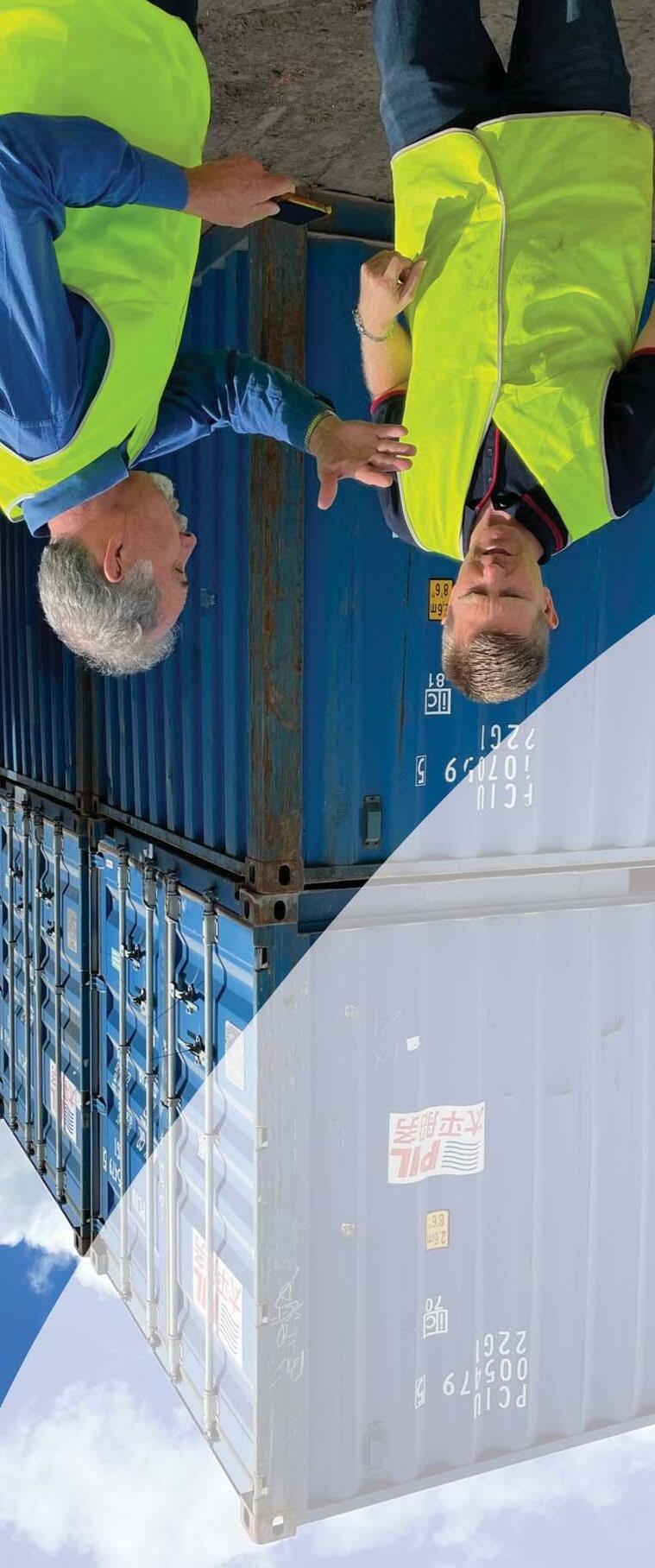
Supply chain efficiency has again been a key theme and focus for GTA in 2021/22 given the good production and high levels of export demand on the Australian supply chain. This demand combined with the shocks from a COVID-19 impacted supply chain has created both challenges and opportunity for our members. International benchmarking of supply chains is a much-used method to gain a good understanding of the fundamental efficiency of a supply chain. In 2021 GTA supported the Department of Infrastructure, Transport, Cities and Regional Development (DITC&RS) to undertake a benchmarking study, developing a methodology and comparing Australia's grain supply chains with relevant international comparators.
Supply chains were also a focus of a Ministerial Round Table I attended in 2021 with a number (23) of other trade focussed industry organisations to highlight to Government the economic impacts of the chaos in the global container and freight markets. This group, made up of industry representative groups has its purpose to:
• Clearly define the problem with the international freight supply chains;
• Identify pathways to draw public and political attention to the problem, and
• To identify solutions.
The recent increases in container freight rates and port charges were raised as keys concerns of the grain industry. Following the Ministerial meeting and further advocacy the Morrison Government tasked the Productivity Commission with undertaking an independent review into long-term structural issues affecting the productivity of Australia's maritime logistics system.
Quality assurance processes in the supply chain including chemical residue levels continue to be a key focus of GTA to ensure Australian grain is compliant with our international customer
requirements and regulations. This is increasingly an area of scrutiny from our customers. GTA and all grain supply chain participants are well supported in this area through the National Working Party on Grain Protection (facilitated by GTA) who held its 49th consecutive Australian Grain Storage & Protection Conference on the 15th and 16th June 2022, and the government funded National Residue Survey.
The ability to manage insect pests in Australia whilst meeting market requirements is critical to the long-term viability of the industry. Stewardship from GTA and industry is important in this area to ensure the key fumigant Phosphine continues to remain a viable component of this management process.
In the uncertain international political landscape, the ongoing participation by GTA in international trade policy development is critical. GTA is well positioned in this area as GTA has direct industry experience and a practical focus to ensure government and trade policy is supportive of trade and does lead to trade disruption.
GTA's focus remains to advocate for open, competitive markets, regulatory coherence based on sound science and risk-based assessments. This includes being actively involved in the International Grade Trade Coalition (IGTC), of which GTA is a long standing and active member. GTA serves on the global Management Council and as Secretary on the IGTC Executive Committee.
Through the IGTC and its own work, GTA has brought issues of importance to Australian industry to several influential global policy forums including concerns with Non-Tariff Measures (NTMs). NTMs including government tools or policy measures that impact trade, have emerged, and remain a significant issue in terms of transparency, risk and cost for the grain industry. GTA in 2021 released an updated Grains NTM Project report.
Trade Agreements and market development
also been a strong focus for GTA in 2021/22 to offset the market impacts of the barley Anti-
Dumping and Countervailing Duties investigations initiated by China in late 2018. This resulted in duties of 80.5% being applied to Australian Barley entering China and resulting a halt to trade levels that annually averaged 4 to 5 million tonnes over the 5-year period to 2018.
GTA has been heavily involved in a Market Diversification push into the Indian market. Working with government and other industry associations GTA has identified key issues and provided input into the proposed India Australia Free Trade Agreement. These included promoting a risk-based approach to trade & biosecurity, and to develop an agreed framework, including regular formal highlevel (Ministerial) dialogue to facilitate this.
The Australian grain industry has evolved from a statutory focussed regulatory framework into an industry driven self-regulatory framework. As part of this transition, multiple government reviews and studies have been undertaken to ensure the market is competitive, transparent and supportive of all sectors of the industry. The three-year statutory review of the Wheat Port Code undertaken by DAFF included several Recommendations including a call for GTA to lead a review of grain stock entitlement. This cross industry and government review confirmed the existing commercial arrangements combined with the GTA Complaints Handling Guidelines is supportive of a transparent market. A new GTA Fact Sheet - Stored Grain Entitlement was also developed as part of this process to assist with industry awareness.
The uptake and employment of new technology within an industry is critical to growth and efficiency. The Board of GTA via its Modernising the Supply Chain strategy has strong focus on industry stewardship and driving improvement through the adoption of technology across sectors including plant breeding, grain assessment technology and information. Stewardship of the new wheat classes (Australian White Wheat and Australian Innovative Wheat) introduced by Wheat Quality Australia will assist industry to have the framework and process in place to manage emerging new varieties within these wheat classes.
Due to the COVID-19 Pandemic the Australian Grains Industry Conference (AGIC), the premier event on the grain industry calendar, was held successfully on a virtual conference platform for the second year running. Once again, the 2021 AGIC program was exceptionally strong with cabinet ministers, local and international business leaders and speakers providing riveting insights on global markets, trade, politics and the business challenges of associated with supply chain constraints.
AGIC Asia, opened by the Hon. Dan Tehan MP Minister for Trade, Tourism & Investment was held in March 2022 as a virtual conference with over 650 delegates from 25 countries on-line for the event highlighting Australian grain and the quality assurance process in the grain supply chain.
The knowledge provided through AGIC Asia about the Australian value chain promotes confidence in the processors and consumers of Australian grain, enabling them to approach their customers with increased confidence. AGIC Asia continues to demonstrate value and have resulted in tangible trade and market access outcomes supporting the maintenance and growth of these important markets.
An aware and educated industry is one that supports growth. The Training and Professional Development programs, delivered by GTA, are an important part of industry stewardship and the selfregulatory framework. These training programs provide professional development opportunities for industry participants to improve their skills and knowledge, and importantly improve industry capability. Technology has been leveraged during 2021/22 to enhance the GTA training offering with the release of two free on-line training modules available to industry in grain sampling and transport safety compliance.
Over the 30 years of GTA's existence the key to its success is and will continue to be based on the support and efforts of all the knowledgeable and skilled industry participants who volunteer their time and expertise as members of the various GTA Technical Committees and Industry Working Groups, as well as the GTA Arbitrators.
Similarly, the commitment and contribution of the current and past GTA Board (also volunteers) and management team, is integral to GTA's success, for which on behalf of the industry I thank them.
The support of this volunteer base and their contributions to GTA are the foundations of GTA's and industry's capability and we should recognise and celebrate the importance of this commitment to the success of our organisation and industry.
GTA Board and management commit to continuing the vision and the hard work commenced 30 years ago by the founding members of the NACMA Board. We aim to be effective in providing products and services that facilitate trade and therefore support our members and in-turn the Australian grain industry.
The grain industry will continue its growth whilst facing increasingly complex challenges including the current world tension and trade impacts. GTA must continue to respond and adapt in meeting the needs of members and to facilitate trade. Your Board is committed to building on the base developed over the last 30 years to ensure GTA continues to support members and the facilitation of trade.
Yours sincerely,


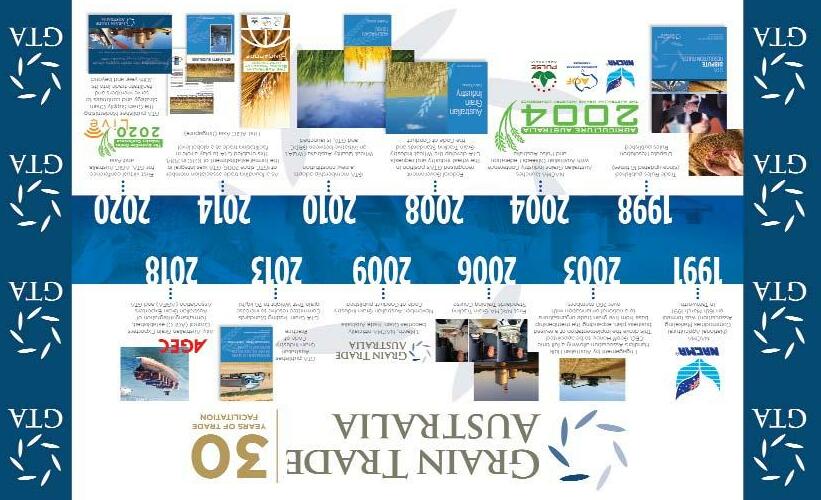 Andrew Goyder Chair - Grain Trade Australia
Andrew Goyder Chair - Grain Trade Australia
GTA members are drawn from across the grain value chain including production through to domestic consumers and exporters. GTA members are involved in grain trading & marketing, grain storage, logistics, and food and feed processing.
GTA also attracts membership from organisations that support the value chain in related commercial activities such as banking & financial services, communications, grain advisory services and professional services (legal and accountancy) and production sector groups.
GTA will:
• Continually reassess its position in the Australian grain value chain ensuring a contemporary approach to fulfilling its vision. Leadership and innovation will be key features of the way GTA will conduct its operations.
• Commit to delivering products and services that add value to our members' businesses and harmonise standards associated with facilitation of trade.
• Work cooperatively with all parts of the grain value chain and service all grain value chain members.
• Build effective relationships with our members and stakeholders.
• Grain Trading Standards - development and the ongoing maintenance of grain Trading Standards that reflect customer requirements, as well as supply-chain and production capabilities.
• Grain Trading Contracts and Trade Rules - that ensure legal rigour to commercial grain trading activities.
• Dispute Resolution Services - underpin contractual arrangements and instils value by ensuring confidence in to participate in the Australian grain industry.
• Trade and Market Access - engaging with policy makers and industry to ensure fair and equitable trade policy and systems for improved market access into domestic and global markets and promoting a grain industry self-regulatory approach in international markets.
• Industry Stewardship and Capability - a determination to increase capability within the grain industry by provision of Australian Grain Industry Code of Practice together with marketorientated training & development programs.
In addition, GTA also has expansive products and services to provide strong foundations for a grain industry proud of its ability to develop and implement a self-regulatory framework and to develop policy settings and processes.
This approach is supported and demanded by GTA members, industry stakeholders, government, and its related agencies.
GTA members look to GTA to continually reassess and develop additional capacity and capability.
• GTA does not have a right to exist - it must continually earn that right from its members.
• Members do not financially support GTA via membership fees or the purchase of products and services out of loyalty but out of the value that GTA is able to offerto their commercial activities.
•
GTA is judged on whether it offers a sound value proposition to members by the value obtained by the member in their last interaction with GTA.
GTA must: - be cognisant of factors in the external business environment that impact both the Australian grain industry and GTA and its operations; and
- operate within the confines and needs of members and the immediate business environment in which GTA operates.
An efficient, equitable and open commercial grain industry in Australia.
Our Mission
To facilitate and promote trade by providing products, services and advocacy for the Australian grain value chain.
PUBLICATION
• GTA Strategic Direction 2021/22
• Modernising the Grain Supply Chain from drought through COVID-19 to 2030
• Dispute Resolution Rules (Revised)
• Arbitration Guidelines (Revised)
• TGD No. 21 Grain Sampling All Scenarios
• TGD No. 22 Sustainability Program Principles and Guidelines
• Australian White Wheat (AWW) Information Paper
• GTA Fact Sheet - Grain Entitlements
• Non-Tariff Measures report
• Update to the Visual Recognitions Standards Guide
• Arbitration Award Summaries
• 27 GTA Member updates
• 14 GTA Market notifications
• 10 Grain Matters editions
• 1 GTA Fact Sheet developed/revised
• GTA celebrated its 30th Anniversary with Gala Dinner in March
• 4 Conferences delivered online, hybrid and face to face
• 27 webinars & workshops delivered
• 60 Technical Committee and Industry Working Group meetings
• 18 Industry submissions lodged
• AGIC Australia & Asia conference events
• Completed the review of the Wheat Port Code Wheat Recommendation 12
• Updated the Non-Tariff Measures report
• Provided stewardship to industry on the introduction of two new wheat classes (AWW & AIW)
• Developed GTA Sustainability Program Principles & Guidelines
• Australian Grain Storage and Protection Conferences
• Introduced industry Standard Data Formats and GTA receival site codes
• Participated in a Ministerial Round Table to address supply chain issues.
• Coordinated the industry response to the Treasury review into the 'quality of financial advice'
• NTM APEC Project - leading global private sector engagement and wheat export case study on DAFF lead APEC Project identifying future work on NTMs affecting the grain trade.
• Profit of $124,861
• Equity of $1,643,579
• As a not-for-profit organisation, GTA cannot distribute profits or build excessive cash reserves.
• GTA is operating within its Cash Reserves Policy.
• Membership fees fund core activities, i.e., Technical Committees, Trade and Market Access Activities and industry advocacy.
• 276 members on 30th June 2022 (2021:269)
• Grain Trading Standards
• Annual Trading Standards review including commencing a review of Wheat Dockage & Foreign Material.
• Review and publication of the Wheat Quality Australia Wheat Varietal Master List
• Released Trading Standards for Wheat, Barley, other cereals published following review
• Comprehensive review of the Visual Recognition Standards Guide
• Released on-line training for Representative Sampling All Scenarios
• Several Sub-Committees involved in ongoing reviews of various Standards issues including: -Wheat Dockage Review -Technology -WQA new wheat Classes - Australian White Wheat & Australian Innovative Wheat
- Contracts & Trade Rules
• GTA Trade Rules - reviewed Modern Slavery provisions
• Released a new TGD - Grain Entitlements
• Member Updates and Submissions on Location Differentials, Trade Rules and Standard Form Grain Contracts
• Location Differentials for 2021/22 season
• Participated in the Wheat Port Code Recommendation 12 review
• Considered industry fumigation protocols
• Reviewed proposed changes to the Voyage Charter Notice of Readiness (NOR)
• Approved the Submission into the Productivity Commission review of the Maritime Logistics Systems
• Reviewed Ausgrain Charter Party
Consult with and advise industry & Government on:
• China Anti-Dumping Investigations and Countervailing Duties on Australian Barley Exports
• Updated the Non-Tariff Measures (NTMs) Report
• COVID-19 Domestic and Global Supply Chain impacts
• Grains Industry Sustainability Framework & Environmental, Social and Governance
• Market diversification - India
• Regional initiatives on Non-Tariff Measures
• Free trade agreements - Indonesia, UK, India
• ePhyto and e-Documentation
• Stewardship of new Wheat Classes
• China GACC Regulation changes
• Submissions to DAFF - Cost Recovery Implementation Statement: Plant Export Certification
• DAFF Congestion Busting Strategy & Projects
• Global Food Security - Ukraine Conflict
• Input into the Government Benchmarking Studies of Australian Supply Chains
• Supply chain consideration of new Wheat Classes
• New Fact Sheet - Grain Entitlement
• Provided direction to GTA's participation in the coalition of industry associations working on national supply chain reform
• Input into a proposed changes to the Voyage Charter NOR
• Made refinements to the Manual for Importing Country Requirements (MICOR)
• Stewardship of the GTA/DAFF joint projectStorage Assets & Management Standard (SAMS)
The Committee addressed the following key issues:
• Response to Gene Technology Scheme Consultatoin & Regulatory impact statement
• Response to the India Non GMO Certificate
• Plant Breeding Innovation - input to global guidance and development of GTA Guidance Document
• Japan plant breeding innovation trade advice
• Global Initiative on Low Level Presence (GLI)
The Committee has progressed work on:
• Industry Standard Reference Data for all major data codes including the provision of standardised receival site codes.
• Common Industry Varietal Code Master List for 2020/21
• Progressing a Technology Roadmap
• E-phyto certificates
• Alignment to the international groups and goal of harmonisation of process and transactions
• Input into the GTA/DAFF joint project - Storage Assets & Management Standard (SAMS)
• DAFF system consultation including PEMS and NexDocs
• Facilitating technology improvements and adoption in the supply chain.
• Training continued via on-line delivery during COVID-19
• 27 training and development courses delivered. 291 students attended from over 20 organisations. In addition to that, 496 students attended GTA online learning courses
• GTA Advisory & Compliance Workshop
• Grain Contracts & Trading Standards
• Grain Export Documentation & Risk Management Workshop
Industry support services conducted by GTA Australian Grain Industry Code of Practice (Code)
• A demonstration of an industry committed to meaningful self-regulation.
• On-line Code of Practice Assessment Program available to demonstrate knowledge and understanding of the Code
• Technical Guideline Documents to assist industry participants to adhere to the requirements as set out in the Code.
• Grain Transport Code of Practice
• On-line Transport Chain of Responsibility module
• On-line safety & sampling training
• Adherence to the Code is mandatory for all GTA Ordinary or post-farm gate Members.
• The primary industry body responsible for providing management and leadership to industry in the areas of post-harvest storage, chemical use, market requirements and chemical regulation.
• Grain Storage and Protection Conference was held twice this FY, in August 2021 (Virtual) and June 2022 (Face to face)
• Continued GTA administrative support of the NWPGP.
• Publication of the Australian Grain Industry Post Harvest Chemical Usage Recommendations and Outturn Tolerances 2021/22
DOMESTIC
• Prime Minister
• Trade Minister
• Agriculture Minister
• DAFF - export inspection & certification processes and trade and market access
• DAFF - domestic issues
• Australian Pesticides and Veterinary Medicines Authority (APVMA)
• Food Standards Australia New Zealand (FSANZ)
• Codex Australia
• Department of Foreign Affairs and Trade
• Office of Gene Technology Regulations (OGTR)
• Department of Transport and Infrastructure
• Department of Industry, Innovation and Science
• Department of Home Affairs
• Department of Treasury
• Australian Securities & Investment Commission
• National Heavy Vehicle Regulator
• Austrade
• Agriculture Victoria
• Tasmanian Department of Natural Resources and Environment
• Productivity Commission
• Australian Seeds Federation
• Pulse Australia
• Australian Oilseeds Federation
• National Farmers
• GRDC
• Department of Foreign Affairs and Trade
• Input into development of a standard for the International Movement of Grain
• Global e-Phyto framework via IGTC
• New plant breeding techniques
• Global Low Level Presence Policy Initiative
• Cartagena Protocol on Biosafety
• Maximum Residue Limits via IGTC
• International Grains Council
• International Seeds Federation
• AGIC Asia - Government Round Table & Policy sessions
• APEC Grain Trade Facilitation Forum
• China National Association for Grain Sector
• COVID-19 - International Response Framework (incl IGTC)
• IGTC Member Organisations (NAEGA GAFTA, COCERAL, CGC etc)
• International Grain Trade Coalition (IGTC) (Exec Committee & Working Groups)
• Grain & Plant Product Export Industry Consultative Committee (GPPEICC) and sub-committees
• ACCC Agricultural Advisory Committee
• Grains Industry Market Access Forum
• DAFF national agriculture market intelligence roundtable

• Agricultural Biotechnology Council of Australia (ABCA)
• National Measurement Institute (NMI)
• Grain Quality Measurements Committee
• Grains Australia Industry Steering Committee
• Grains Australia Director Selection Committee
• Industry Working Group on China Barley Issues
• Forum Australian Importers and Exporters Associations - Supply Chain Issues
• Grains Industry NTM Working Group
DOMESTIC
• Crop Life Seminar, Australian Grain Industry Guidelines for Information Sharing for Products derived from Plant Breeding Innovation Technologies, July 2021
• Australian Grain Storage & Protection Conference, Opening Address August 2021
• Australian Grain Storage & Protection Conference, Update on Market Access Priorities, August 2021
• Australian Grain Industry Conference, Opening Address, September 2021
• Australian Grain Industry Conference, Closing Address, September 2021
• Grain Industry Association of Victoria, GTA Activities and Update several 2021/22
• Grain Industry Association NSW, GTA Activities and Update, several 2021/22
• DAFF Preharvest Meeting, GTA & Industry Update, September 2021.
• Grain Growers Limited Policy Group, Storage Asset Management Systems, Sept 2021
• Port of Melbourne Webinar, Grain Supply Chain Update & Pre-harvest Issues, Sept 2021
• GTA 30th Anniversary Dinner, Chairmans Welcoming Address March 2022
• Australian Grain Storage & Protection Conference, Opening Address June 2022
• Australian Grain Storage & Protection Conference, Update on progress or review of AgVet Chemical Regulations in Australia - postfarm gate perspective, June 2022
• Australian Grain Storage and Protection Conference, Market Choice FrameworkIndustry Stewardship approach to new technologies, June 2022
• Australian Grain Storage and Protection Conference, Grain Protection - more than storage, June 2022
• Numerous (291) stakeholder meetings, briefings to members, broader industry, government and their related agencies
• AGIC Asia, Meeting Customer Requirements, Sept 2021
• AGIC Asia, Revitalising and Modernising the Grain Supply Chain, Sept 2021
• APEC NTM Working Group, Wheat Case Study, August 2021
• Austrade China Seminar, Australian Grainconsidering the value proposition, October 2021
• Australian India Business Exchange, Australian Grain - quality, safety & reliability, Sept 2021
• Austrade Ethiopia Seminar, Australian Grainconsidering the value proposition, Sept 2021
• Austrade Saudi Arabia Seminar, Australian Grain - considering the value proposition October 2021
• AEGIC Mexico Barley Webinar, Australian GrainEnsuring quality, safety & reliability Virtual, October 2021
• AEGIC Mexico Canola Webinar, Australian Grain - Ensuring quality, safety & reliability October 2021
• International Grain Trade Coalition, General Assembly Address, November 2021
• International Seed Federation, Australia's regulatory framework & NBT Developments December 2021
• AEGIC South Africa Barley Webinar, Australian Grain - Ensuring quality, safety & reliability February 2022
• AEGIC Brazil Barley Webinar, Australian GrainEnsuring quality, safety & reliability, February 2022
• AEGIC Peru Barley Webinar, Australian GrainEnsuring quality, safety & reliability, February 2022
• AEGIC Ecuador Barley Webinar, Australian Grain - Ensuring quality, safety & reliability February 2022
• AGIC Asia, Opening Address, March 2022
• AGIC Asia, Australian Grain - Ensuring quality, safety & reliability March 2022
• International Grains Council Conference, Role of Trade and Trade Organisations in Global Food Security June 2022
Modernising the grain supply chain - from drought, through COVID-19 to 2030
Improving supply chain efficiency, improves the value of every tonne of grain and industry global competitiveness. That value will flow to all participants in the Australian grain supply chain including regional communities.
GTA, with its member driven Technical Committees have developed an innovative strategy called “Modernising the grain supply chain - from drought, through COVID-19 to 2030”. This has identified four key “Strategic Growth Pillars” and several industry driven 'strategy enabling projects' to develop and grow industry, through strategic efficiency gains in the supply chain.
The Strategic Growth Pillars are:
& Capability
& Market Access
& Logistics
Investment in the grain supply chain and in the industry is critical to remain competitive into the future and to capture the benefits and to deliver economic growth for Australia. This is especially the case given 30-35% of a grower's total cost is supply chain related and the traditional quality advantage for Australian grain is under pressure as processers increase their efficiency and utilisation of grain from alternative origins.
However, industry alone cannot make the required supply chain investments or drive the system wide operational efficiencies on their own. There are several reasons including:
1. The overall size or quantum of investment required.
2. The risks around developing new technology.
3.The broad base of beneficiaries across the value chain.
4. Limited “first mover advantage” for developing new technology.
5. Limited “first mover advantage” for investing in certain infrastructure relating to precompetitive activities.

This means, public and industry partnerships are needed for investment. GTA and Government recognise the importance of aligning whenever possible industry and Government strategy and policy to drive industry economic value and global competitiveness and deliver value to regional communities.
GTA in conjunction with the Department of Agriculture, Fisheries and Forestry (DAFF) are collaborating to develop an industry driven GTA Grain Storage Asset and Management Standard (Standard) for Australian grain industry participants.
This is the first major project addressed from the GTA's Modernising the grain supply chain strategy, of collaborative investment to drive value within the supply chain and to create a more efficient and globally competitive Australian grain supply chain. DAFF's objective for the project is to deliver efficiencies through recognition of the Standard in meeting Government's regulatory requirements. The project now moves into a pilot phase where the principles will be tested through practical trials, to capture implementation issues and develop methodology and parameters to measure project value. The voluntary framework will aim to deliver efficiencies to industry and may include, but is not limited to, the adoption of emerging technologies, innovative assurance methods and more industry efficient regulation.
The Standard will allow farm-based and commercial storage assets and their operation to be integrated into an industry driven quality assurance system in the export (and domestic) supply chain thus reducing industry exposure to risk and reputational damage and better reflect export requirements.
• Environmental Social & Governance (ESG) issues are gaining prominence in terms of consumer and policy, including development of international guidelines and protocols. These issues include environment, sustainability, social licence, food safety and Greenhouse Gas issues.
• GTA recognises that sustainability including ESG is an important issue for the industry and GTA members. GTA will work with other grain industry sectors to provide guidance on member and customer requirements for ESG.
• GTA has incorporated ESG into the Terms of Reference of the Board Governance Committee and renamed it to the ESG Committee.
• GTA's general policy and practical approach is to develop ESG strategic direction, policy principles, and guidelines. GTA's mandate is to, encourage, promote, and inform policy positions to its members.
• GTA sees that the Code of Practice and the Grower Guide to Grain Production provides an over-arching perspective. GTA recognises individual industry segments, members and commercial companies may also develop their own policies, statements and other arrangements based on their own commercial situations and needs.
• GTA has developed a Technical Guideline Document (TGD) on Sustainabilitythat outlines some principles and guidelines that: acknowledges the importance of a sustainable grain industry, focuses on developing relevant principles and guidelines to assist members, encourages a risk-based assessment approach and avoids additional Non-Tariff Measures highlighting the importance of the Code of Practice in terms of quality assurance through the supply chain, and communicates with stakeholders (regulators, consumers, social licence) recognising the need to address a variety of perspectives, priorities and understanding.
• Customer survey work showed that grain consumers primary concerns are price then food safety (chemical residues), traceability, nutrition (quality) and accreditation.
• The Australian grain industry has a strong and positive ESG story, with solid foundations in place across the industry, recognising the customer priorities identified from consultation projects, the foundations around the Sustainability are summarised in the table below.
Price GTA Contracts, Trade Rules, Dispute Resolution
Food Safety Code of Practice cl, MRLs (TGD 15), NWPGP, APVMA, NRS (TGD 20), Grower Guide (TGD 11), Govt Inspection
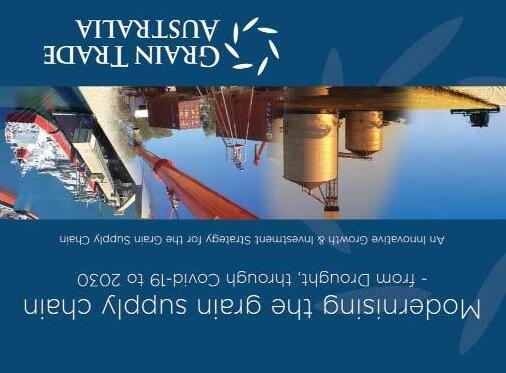
Traceability Code (1 back/fwd), stock selection, sampling & testing (TGD 21)
Nutrition Trading Standards, Classification, (Quality) strengths Aust grain, RD&E, Grower Guide (TGD 11)
Human/Safety Code of Practice, GTA Safety Guidelines, OHS Laws, COR, Training & Development
Sustainability GTA Sustainability Program Principles & Guidelines (TGD 22), SGA
• The GTA TGD and its position and “principles and guidelines” have been developed through a member driven approach and consultation.
The following persons were Directors of the company during the whole of the financial year and up to the date of this report, unless otherwise stated:



BOARDAPPOINTMENT
EXPERIENCEANDEXPERTISE:
Managing Director Grain Link WA, established 1999. Andrew is a company Approved Arbitrator. Previously involved in Seed Industry and Export Canola with SGB Australia and Grain Pool WA as regional manager southern WA. Andrew completed Australian Institute of Company Directors Course (GAICD).
Chair of Company's Board, Chair of Environment, Social & Governance Committee, Member of Audit, Finance and Remuneration Committee
Non-Executive Director
BOARDAPPOINTMENT
QUALIFICATIONS:
Bachelor of Law, Bachelor of Arts
EXPERIENCEANDEXPERTISE: Partner - Holding Redlich

SPECIALRESPONSIBILITIES:
Chair of Transport, Storage & Ports Committee, Chair of the Dispute Resolution Service Committee, Deputy Chair of Commerce Committee, Member of Environment, Social & Governance Committee, Member of Membership Committee
QUALIFICATIONS:
Diploma Applied Science (Agriculture)
Experience and expertise: Michael has been an active member of the Australian Grains Industry for 30 years.He is the Managing Director of Melbournebased grain trading and logistics company, Rural Logic Founding Manager (1990) of Stockfeed company James & Son for 10 years. Aust Barley Board Victorian State Manager (5 years) and Grains Manager IMCA Malting Company (2005/2006).
Former President of Grain Industry Association of Victoria and has remained on the Committee since 2005.

SPECIALRESPONSIBILITIES:
Chair of Commerce Committee, Member of Trade & Marketing Access Committee, Member of Dispute Resolution Service Committee, Member of Audit, Finance and Remuneration Committee, Member of Environment, Social & Governance Committee.
MERCHANTASSOCIATIONNOMINATION
QUALIFICATIONS:
Bachelor's Degree in Business, Graduate Diploma in Accounting and Master's Degree in Business (International Business), GAICD.
Managing Director Farmarco Australia, 30 years' experience in commodities, both physical & derivative markets. Rob is the Managing Director of Farmarco Australia having held a number of roles there throughout his career following a background in rural accounting and the sugar industry. Rob is a director of Cotton Compass and currently a Committee Member of Queensland Agricultural Merchants (QAM) Inc. Rob is a GTA Approved Arbitrator.
Chair of Audit, Finance and Remuneration Committee, Deputy Chair of Standards Committee
QUALIFICATIONS:
B. Commerce (Banking & Finance), Post Graduate Diploma ASIA (Treasury Stream)
EXPERIENCEANDEXPERTISE:
General Manager (Marketing & Trading)- CBH Group, 20 plus years experience.Commenced career with Grain Pool (now part of CBH Group) in WA, including 4 years in Indonesia as President Director of PT Eastern Pearl Flour Mills. Former GAFTA Council Member and continues to act as a Director for a number of CBH subsidiaries.
Chair of Trade & Market Access Committee, Chair of Plant Breeding for Innovation Committee, Deputy Chair of Transport, Storage & Port Committee, Member of Environment, Social & Governance Committee, Member of Audit, Finance & Remuneration Committee.
ORDINARYLEVELBNOMINATION
BA in Economics - Denmark, BA in International Business - London, Masters of Applied Finance from Kaplan, MBA-AGSM, Sydney, GAICD
EXPERIENCEANDEXPERTISE:
Has been involved in International Trading for more than 20 years in a number of different roles in Grain, Sugar and Steel. Held international trading roles in the UK, Hong Kong and Australia. Former director of Barley Australia. Is a company arbitrator.
Chair of Membership Committee, Deputy Chair of Information Technology Advisory Committee, Member of AGIC Business Committee, Member of Dispute Resolution Service Committee, Member of Audit, Finance and Remuneration Committee.

ORDINARYLEVELANOMINATION
QUALIFICATIONS:
Bachelor of Economics- Adelaide University and CPA
EXPERIENCEANDEXPERTISE:
Has 29 years' experience in grain trading, specialising in Barley. Currently, Senior Commercial ManagerGlencore Agriculture Pty Ltd, Australia. Formerly, with the Australian Barley Board SA, Viterra and joint head of Glencore's global barley trading operations in The Netherlands.
SPECIALRESPONSIBILITIES:
Chair of Australian Grain Exporters Council, Deputy Chair of Commerce Committee, Deputy Chair of Trade & Market Access Committee, Member of Membership Committee, Member of Environment, Social & Governance Committee
BOARDAPPOINTMENT
QUALIFICATIONS:
Master of Agribusiness, University of Melbourne, GAICD
EXPERIENCEANDEXPERTISE:
Simon is the owner of a dry land, broad acre grain farming enterprise, Yellow Grain Pty Ltd based in the Wimmera, Victoria. Simon has extensive knowledge of modern agronomic production systems, which focus on profit, risk management and sustainability, operating in a highly variable climate.
SPECIALRESPONSIBILITIES:
Deputy Chair of Standards Committee, Member of Commerce Committee, Member of Transport, Storage & Port Committee, Member of Membership Committee, Member of AGIC Business Committee, Member of Environment, Social & Governance Committee.
ORDINARYLEVELCNOMINATION

QUALIFICATIONS:
DipAppSc(AgServ) The University of Melbourne
EXPERIENCEANDEXPERTISE:
Michelle Kerr has been employed at Riordan Grain Services since 2004 where she currently works as the Assistant to MD. Michelle is a current member of the advisory board for the Riordan Group Pty Ltd, a former committee member and former treasurer of the Grain Industry Association of Victoria (GIAV). Michelle is a company arbitrator.
SPECIALRESPONSIBILITIES:
Chair of Trading Standards Committee, Deputy Chair of Transport, Storage & Port Committee, Member of Dispute Resolution Service Committee, Member of AGIC Business Committee, Member of Environment, Social & Governance Committee
MERCHANTASSOCIATIONNOMINATION
QUALIFICATIONS:
BSc Biotechnology (Hons), The University of Reading
EXPERIENCEANDEXPERTISE:
Daniel Marsh is currently Deputy CEO of the Australian Exchange (AEX) Group. AEX Group offers globally competitive licensed marketplaces for derivative products with a particular focus on tradeable products within the commodity, energy and environmental asset classes. He has 20 years of experience including head of Agricultural Commodities Trading with the Global Markets division of the Commonwealth Bank of Australia (2017-2020), Group Treasurer at George Weston Foods (20092017) and derivatives risk management and trading at JPMorgan in London (2000-2008).
Chair for Information Technology Advisory Committee, Deputy Chair of Plant Breeding for Innovation, Member of AGIC Business Committee, Member of Audit, Finance and Remuneration Committee.




ORDINARYLEVELBNOMINATION
QUALIFICATIONS:
BA in Agricultural Systems from UWS, Graduate Certificate in Applied Finance from Kaplan and has completed the Australian Institute of Company Directors course.
EXPERIENCEANDEXPERTISE:
Richard Perkins has over 15 years' experience working in Australian and international grain markets. He is currently the General Manager of Business Development, Advisory and Marketing at Market Check, an independent grain marketing adviser and pool provider for Australian growers.
Deputy Chair of Trade & Market Access Committee, Member of Audit, Finance & Remuneration, Member of Information Technology Advisory Committee, Member of AGIC Business Committee, Member of Dispute Resolution Service Committee
GTA will continually review the products & services that support & allow “trade facilitation” to ensure they reflect the commercial grain trading environment. This will be achieved via engagement and input from the GTA Technical Committees, GTA members and the broader grain industry. The review process will be public, transparent & open to all.
GTA operates the following Technical Committees comprised of industry personnel:
Trading Standards Committee
2. Commerce Committee
3. Trade & Market Access Committee
4. Transport, Storage & Ports Committee
5. Plant Breeding Innovation Committee
6. Information Technology Advisory Committee
The Charter for the GTA Technical Committees is composed of:
1. Common section which contains issues common to all Committees (Committee size, quorum etc)
2. Terms of Reference for each Technical Committee;
3. Terms of Reference for Sub-Committees; and a
4. Confidentiality Agreement.
The Charter of the GTA Technical Committees is available on the GTA website
• GTA is reliant on the Technical Committees to review and develop the GTA commercial resources
• GTA Technical Committees are skills based
• All Technical Committee votes require a 2/3 majority
• The Committee structure allows members to raise issues that impact on their commercial operations and lead to industry consensus on contracts, Trade Rules, grain Trading Standards, market access issues, systems and industry processes
• GTA calls for nominations to theTechnical Committees each year and the GTA Board select Committee members based on the applicant's technical competency whilst mindful that the Committees aim to have representation from: -sectors across the grain supply chain affected by the decisions of the Committee; -large and small organisations; and -all major grain production/trading states
• All Committees are chaired by a GTA Director with a second Director as Deputy Chair
• GTA Committee members agree to participate on a Committee for the benefit of all members and they do not represent the interests of an industry sector or a private or public organisation
• All Committee members agree to be bound by the GTA Anti-competitive Clause as tabled on the agenda at all meetings.
• Consult with industry and develop grain Trading Standards to apply for the following season. Recommend to the GTA Board changes to existing GTA Trading Standards for adoption.
• In conjunction and following consultation with industry, consider quality assurance and associated protocols including additional reference materials across the grain value chain that assist in interpretation and implementation of GTA Trading Standards.
• Advise on the effective adoption and implementation of the GTA Trading Standards by individual companies and by the relevant sectors of the industry.
• Communicate between the GTA Board, GTA Management and the GTA Trading Standards Committee on industry matters that relate to GTA Trading Standards.
The GTA Trading Standards Committee is responsible for the annual review and development of cereal grain and wheat Trading Standards.
The Committee focussed on research projects including Wheat Dockage and Foreign Material - All Cereals, the Standard for SFW1 wheat and continued the ongoing review of the Nil Tolerance parameters with the focus on finalising a position on the delivery of grain contaminated with eucalypt gumnuts.
Following a thorough review, the Visual Recognition Standards Guide (VRSG) was extensively updated for the 2021/22 season to provide greater clarity to industry on the definition and interpretation of defects as outlined in each commodity Standard.

GTA grain Trading Standards are a key component of the quality framework for the Australian grain industry. The Committee's objective is to unequivocally provide confidence in the quality of Australian grain to processors and consumers and to provide a quantitative quality framework that facilitates market access and trade and supports GTA's Trade Rules and Contracts.
During 2021/22, the Committee undertook its annual review of the GTA Trading Standards, calling for industry submissions through two rounds of consultation with industry. A number of Sub-Committee meetings were held to consider specific issues identified for review during that submission process.
The Committee were informed during 2022 by Grains Australia/Wheat Quality Australia of its decision to introduce a new Hard wheat ClassAustralian Innovative Wheat (AIW). This followed the release of AWW in 2021, the first major addition and change to the Wheat Class system since the introduction of APW (in the mid 1990's).
The Committee and a GTA Working Group continues to progress a review and industry consultation to ensure the effective implementation of these Classes into the Trading Standards framework.
All changes to grain Trading Standards were included in the Trading Standards database for use by industry.
releases the Grain
on 1 August each year following approval by the GTA Board. All current grain Trading Standards are available on the GTA website.
SaundersCommodity Inspection Services43
ShanleyGrainCorp Operations Ltd43
PanozzoAllied Pinnacle44
MainEmerald Grain44
Nelson Grain Growers Ltd44
• Advise the GTA Board on changes to existing and development of new, Trade Rules and Dispute Resolution Rules.
• Advise on the effective adoption and implementation of the GTA Trade Rules by individuals and by the relevant sectors of the industry.
• Foster communication between the GTA Board, Management and the Commerce Committee on industry matters that relate to GTA Trade Rules and Dispute Resolution Rules.
• Advise the GTA Board of any developments and/or implementation of Location Differentials pan Australia; and
• Report and make recommendations to the industry on all matters of relevance addressed by the Commerce Committee.
The GTA Commerce Committee held a number of reviews during the 2021/22 year including:
• Modern Slave Labour, Anti-Corruption and AntiSanction provisions for inclusion in the GTA Trade Rules.
• Reviewed a proposed change to the Ausgrain Voyage Charter Notice of Readiness provisions that apply under certain circumstances
• Continued the ongoing work and industry discussion on fumigation protocols within grain contracts
• Completed a review of the outcomes of the DAFF Wheat Port Code Review - Recommendation 12 that included the development of a new Fact Sheet - Grain Entitlement.
• Approved the Submission into the Productivity Commission review of the Maritime Logistics Systems.
• Continued the improvement of the Location Differentials process and procedures
-Standard Operating Procedure for Reviewing Location Differentials
-Standard Operating Procedures for Reviewing GTA Contracts
-Standard Operating Procedure for Reviewing Trade Rules
The GTA Commerce Committee reviewed and published Location Differentials for 2021/22, following the regular industry submission and consultation process and commenced preparation of the 2022/23 Location Differentials.

Following GTA Member consultation (via Member Update 7 of 22) the Committee called for consultation on the proposed amendment to the GTA Trade Rules by the inclusion of clauses relating to Modern Slavery, Anti-Bribery and Anti-Sanction.
During 2021/2022 the Committee covered wide ranging topics and assisted and provided direction on matters including, the commercial aspects of the introduction of new wheat classes, market commentary on international and Australian price relativities and aspects of the Voyage Charter Notice of Readiness applicable to vessels that fail the DAFF phytosanitary inspection.
The Commerce Committee continue to provide a forum for industry commercial discussion, support and direction in the areas of commercial trade.
GTA Contracts & Trade
Rules provide the stable & consistent contractual framework for the facilitation of trade throughout the value chain from producer to processor/ consumer. The framework objective is greater commercial certainty, fairness and reduced risk for all participants in the grain value chain.
A key outcome is increased industry confidence supporting the facilitation of trade. This confidence in the 'terms of trade' creates value for GTA members and industry.
The Plant Breeding Innovation Committee makes recommendations to the GTA Board and industry on potential effect to commercial activity from the: •planned intentional release of approved GMgrain events; or the • unplanned and unintentional release (escape) of unapproved grain events and •the implications arising from plant breeding innovations
• Ensure appropriate commercial processes exist to enable fair and efficient trade of grain which contains approved GM material
• Consult with and advise where required, technology proponents and other related parties in relation to GM “pipeline” events intended for release in Australia
• Work proactively with technology proponents and key industry stakeholders to prepare for any regulatory or Freedom to Operate approval for commercial release and cultivation of a GM crop
• Maintain, review and utilise as required the Market Choice Framework for GM Crops

• Utilise the Market Choice Framework, as appropriate, to ensure a seamless integration into the Australian grain market of approved crops which will ensure market access and market choice
• Develop and maintain agreed cross sector 'unintended presence' response processes for use should there be a detection of an unapproved GM crop
• Coordinate activities at an industry/government level on supply chain issues relating to GM crops containing approved and unapproved GM events
• Monitor developments in relation to plant breeding innovation and develop industry responses/policies as required
A major initiative under consideration and development across the Plant Breeding Innovation Committee and other Committees is the proposed development of a GTA Market Choice Framework Guidance Document that outlines a collaborative approach to stewardship of new technologies impacting the grain supply chain including the introduction of varieties using innovative plant breeding technologies.
Committee has commenced the progression of this initiative through engagement with the wider industry to commence the conversation on which to build an agreed approach. Key activities for the Committee were:
• Provision of input to the inquiry into the proposed changes to the explanatory notes on essentially derived varieties under the UPOV convention. GTA noted the importance for Australia and its grain producers to have access to innovative seed technology to maintain and enhance its position within the global trading environment and supported the proposed changes as they provide greater incentives for continued and higher levels of investment by seed breeding companies and continued innovation of the seed varieties available to the Australian grain industry, which should assist in the ongoing sustainability of the Australian grain industry.
• Response to Food Standards Australia New Zealand (FSANZ) Proposal P1055 - Definitions for gene technology and new breeding techniques. GTA is supportive of the risk-based approach contained in FSANZ's preferred option. This reform will assist to future-proof the regulatory approach and provide clarity and certainty on the regulatory status and assessment requirements for food produced using new breeding techniques (NBTs). GTA supports the approach that regulation: -should not be unnecessarily restrictive; -commensurate with identified risks; and -underpin health and safety of Australia's food supply.
• Submission into the Office of the Gene Technology Regulator (OGTR) Reg-003; a proposal to include dealings with GM canola on the GMO register - Grain Trade Australia (GTA), on behalf of its members, welcomed the opportunity to comment on the consultation RARMP on the consideration to include MON00073-7 canola on the GMO Register. GTA noted its support for a science-based approach employed by the OGTR in relation to regulating commercial transactions with viable GMOs.
• The Committee also provided input to a review by Biosecurity Tasmania and its Draft Biosecurity Regulations 2022. GTA strongly opposed the Tasmanian Government proposal to deal with SDN-1 modified organisms as a biosecurity risk. While noting that this was an inappropriate use of the biosecurity provisions, GTA also noted the potential risks for this action to reduce choice to farmers and markets.
• Foster communication between the GTA Board, Management, and the Transport Storage & Ports (TS&P) Committee on industry matters that relate to logistical and supply chain issues.
• Advise the GTA Board of any recommendations made by the Committee in relation to changing legislation such as Heavy Vehicle National Law and Chain of Responsibility.
• Advise the Board and report to industry on all other matters of relevance addressed by the TS&P Committee.
• Report and make recommendations to the industry on potential changes to process and systems that may reduce impediments and provide a more secure and safe supply chain.
• The TS&P Committee engaged and provided Input into the Government Benchmarking Studies of Australian Supply Chains comparing movement of commodities, domestically and internationally to help evaluate supply chain performance and identify areas for potential reform.
• Provided logistical view and consideration into the introduction of the new wheat Classes.
• Engaged and provided direction to GTA's participation in the coalition of industry associations working on national supply chain reform and the issues of poor performance in the container supply chain.
• Input into ongoing supply chain impacts due to COVID-19 related issues.
• Progressed discussion and direction into a proposed change to the Ausgrain Voyage Charter Notice of Readiness arrangements relating to vessels that fail survey when occupying the seaport terminal load berth.
• Made refinements to the Manual for Importing Country Requirements (MICOR)
• Stewardship of the GTA/DAFF joint projectStorage Assets & Management Standard (SAMS)
• Consulted on and endorsed proposed AntiSlavery & Anti-Corruption amendments to Trade Rules.
During 2021/2022 the TS&P Committee continued to provide industry, GTA members, other Technical Committees and GTA Board technical guidance on issues of relevance from a grain supply chain perspective. This included the release of a Submission to a government review: Submission to the Productivity Commission - Australia's Maritime Logistics System.
The impact of COVID and the Ukraine conflict has created supply chain and labour access issues that have led to slippages in export programs. This may be an occurring issue in years of larger than average production as the supply chain balances investment and utilisation of assets for fluctuating production seasons.
However, whilst challenged GTA is pleased to report the supply chain is functioning at high capacity and should establish new record benchmarks during 2022.
Government transport strategy is critical in the development of the shape and efficiency of the supply chain. GTA and the Committee continue to seek opportunities to engage with government and in 2021/22 participated in the grain component of the published Department of Infrastructure National Freight Benchmarking study. The objective of this study was to increase the available data to measure, monitor and evaluate Australia's supply chain performance and highlight the key
in Australia's grain supply chain.
Efficient transactions and movement of grain to meet the demand of domestic and overseas markets is important in ensuring a competitive Australian grain industry. This process includes up-country receival and storage, rail and road transport, and efficient and equitable bulk and container port facilities.

• Proactively manage trade and market access issues impacting the sector.
• Advance independent, fact-based dialogue and advocacy for members and industry stakeholders. Engage with members to prioritise trade and market access issues and promote the positioning of grain industry issues with the Australian Government and in international forums.
• Support and where applicable shape federal and state government's efforts to ensure that trade is not impacted by technical barriers that may arise in global forums such as the WTO, IPPC, FAO, CODEX, in trade agreements, through country actions, and/or via state based legislative actions.
• GTA's trade and market access strategy seeks to develop domestic and global policies and approaches to position the industry to take advantage of trade opportunities, minimise impacts and constraints to trade, and enable trade to continue in an efficient and equitable manner.
• Focus on improved market access outcomes for its members and the grain industry encompassing new access opportunities, improved access arrangements and maintaining existing market access.

The TMAC provides input across a broad range of trade and market access opportunities and issues and supports GTA activities in this area. Further information about GTA TMAC activities is provided in a separate section of this Annual Report.
Key activities for the Committee across the year included:
• Consultation and feedback to Government on: -Free Trade Agreements - consultation, input and submissions into several FTA's and FTA reviews, including Indonesia, China, India EU, RCEP, UK.
-Implementation of the Indonesia/Australia Comprehensive Economic Partnership Agreement (IA-CEPA).
-Covid 19 related issues and responses -Global Food Security consequences of Russian/Ukraine conflict.
-AGVET Review - The Committee continues to provide support to GTA in activities relating to the Government Review of the pesticides and veterinary medicines regulatory system in Australia. GTA will continue its advocacy to ensure Government note industry concerns with several of the Reviews proposals.
• China - ongoing advocacy relating to the AntiDumping (AD) and countervailing duties (CVD) investigation by China against Australian barley exports, ongoing monitoring of the Wheat and Barley Protocol Industry Management Plan, management of quarantine pests of concerns and COVID 19 declarations, review of the changes to China's GACC regulations regarding grain storages, and maintaining relationships with China grain sector.
• Development of a Sustainable and diversified Market Portfolio - The Committee worked on a strategy to redefine and capture value with an objective on shifting market focus, reassessment of country risk, new models and focus on innovation and modernising value chains.
• Developing an Australia - India Grain Strategic Partnership, an initiative to bring together Indian and Australian decision makers from government and industry to foster relations and maximise opportunities for collaboration to advance shared interests and activities of mutual benefit to both countries.
• Published the third Non-Tariff Measures (NTM) Report that enables industry to identify, prioritise and communicate the impact of NTMs on the grain trade and grower returns to government and other stakeholder.
• NTM APEC Project - leading global private sector engagement and wheat export case study on DAFF lead APEC Project Identifying Future Work on NTMs affecting the grain trade.
• Completed review and consultation of Wheat Port Code Review Recommendation 12 on up-country storage
• Engagement with GTA members and industry on:
-NRS outcomes and participation
-Adopting a “Market Choice Framework” and information sharing approach for the impending release of new grain classifications and varieties to ensure the seamless introduction of new plant breeding outcomes by understanding, considering and discussing market access and supply chain implications.
• Input into range of SPS issues across a number of markets.
• Submissions to Productivity Commission on port and container supply chain issues
In addition, the TMAC maintained input across core activities including:
• DAFF - Grain and Plant Products Export Industry Consultative Committee (GPPEICC).
• Global policy developments through active participation in the International Grain Trade Coalition (IGTC)
• Participation in free trade agreement discussions and submissions to Government agencies.
• Submissions on behalf of members to Government agencies and global institutions, including DAFF, DFAT, APVMA, Productivity Commission.
GTA will proactively manage trade & market access issues and advocacy for members and industry stakeholders.
GTA provides leadership to the Australian grain industry maximising value and optimising outcomes in relation to Trade & Market Access.
DeanNSW Farmers
HinzeHolding
James SaundersCommodity Inspection
• Advise the GTA Board of opportunities to collaboratively investigate system, process and research initiatives that may resolve common grain industry process and transactional issues.
• Foster communication among GTA members and seek opportunities to share information, ideas, and learnings across companies in the development of industry reference material, including common transactional processes.
• Report and make recommendations to industry on potential changes to process and systems that may reduce impediments and support the improved facilitation of Trade.
• Identification of risks, gaps, and opportunities for the grain industry from a data and information technology perspective.
• Provide a consultative and advisory function to GTA's Board, Technical Committees and, on behalf of industry to stakeholders including Government Departments, Agencies, and other relevant stakeholders to improve data exchange across industry and Governments (local and global) to improve the efficient facilitation of trade.
ITAC had several areas of focus during the 2021/22 year including:
• Continued a review of the introduction of industry Standardised Reference Data including naming conventions and code nomenclature for standard items. This included the annual review and release of the Grain Industry Varietal Code Master List and the establishment of common data codes for all receival sites listed in the GTA Location Differentials, Port Codes, Port Zones and Site Codes.
• Continued the process of considering the provision of industry direction through an industry 'Information Technology Road Map' strategy to provide context for GTA members and to highlight the synergies achievable through technology across industry and government.
• Providing a forum to engage with government and international bodies to discuss and progress the introduction of new systems and processes. The importance of this role is increasing as technology advances towards improved interconnectivity to improving collaboration and efficient engagement between countries and between companies.
The Committee continues to seek opportunities to leverage government IT initiatives and strategy including the government traceability programs and the 'national blockchain roadmap'. This work is important as it enables an understanding of government direction and to build industry/government rapport.
Progress on modifications to the DAFF Management Systems (PEMS) and export trade systems NeXDOCs continues to frustrate industry as the progress on these upgrades and modifications has been slow. This Committee and other GTA Technical Committees will continue to provide assistance and input into these important government initiatives.
ITAC also provides a forum to improve GTA members awareness of trade engagement via IGTC of the global Government to Government e-Phyto project. This project facilitates the harmonised exchange of electronic phytosanitary certificates (ePhytos) between countries.
The grain industry has a high reliance on data and transactional processes.
The Information Technology Advisory Committee's role is to provide a collaborative and consultative platform for a cross section of industry to review and discuss data and processes where there is no commercial advantage, and such collaboration may add value and improve facilitation of trade.

A foundation for success for all is a strong and robust industry. GTA recognises the ongoing importance of industry groups, associations and organisations coming together to strive for broader industry benefit. In its role to “facilitate trade” GTA provides governance and support to specific market sectors and existing industry groups through the Sector Council model.
• GTA facilitates two Sector Councils. The Australian Grain Exporters Council (AGEC) commenced in 2018/19 as the inaugural Sector Council. In 2020/21 GTA established the Domestic Sector Council, comprising food and feed manufacturers and processors. This Council recognises the domestic market is collectively the largest market for the consumption of Australian grain.
• A Sector Council is a proven, suitable, and flexible framework, open for consideration by industry participants with significant involvement within an industry sector. Sectors Councils are formed and continue to exist if driven by industry and GTA members.
The Charter of GTA Sector Councils is composed of:
1.Common section which contains a description of the Role of the Sector Councils; its Membership and meeting conduct.
2.Terms of Reference for specific Sector Councils;
3.Terms of Reference for Sub-Committees; and a
4.Confidentiality Agreement.
Key points of the GTA Sector Councils
• GTA Sector Councils provide a platform and an industry model for existing industry member associations to integrate and gain support from the existing GTA structure, resources and governance arrangements.
• GTA Sector Councils, approved by the GTA Board consider those issues relevant to its area of expertise / interest. During establishment as a GTA Sector Council its scope and direction will be agreed and included into its Terms of Reference.
• GTA Sector Councils are skills based and consist of a Council and an Executive Committee.
• On an annual basis the members of each Sector Council will select via a member vote the Chair and members of the Council's Executive Committee.
• The Sector Council Executive Committee may invite any member of the industry to join the Executive Committee in an advisory capacity and determine their ongoing involvement in the committee.
• GTA Sector Council Members agree to participate for the benefit of all members, and they do not represent the interests of an industry sector or a private or public organisation.
• All Sector Council members agree to be bound by the GTA Anti-competitive Clause as tabled on the agenda at all meetings.
The purpose of Australian Grain Exporters Council (AGEC) is to make recommendations to the Board on issues that are of importance and direct impact on exporters of grain from Australia including issues within the supply chain, trade policy matters, sanitary and phytosanitary measures and issues of government policy or practice that may impact the sector.
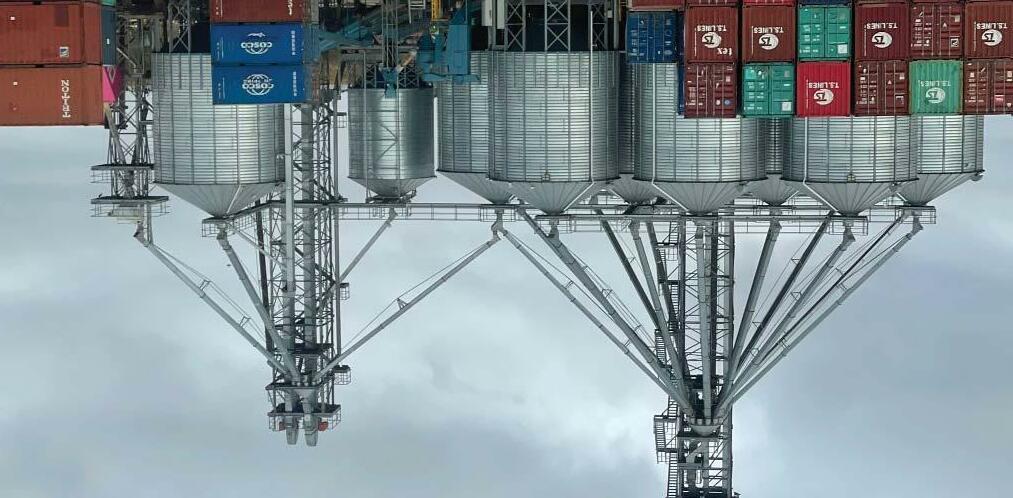

AGEC focuses on matters with operational risk and commercial impact.
• Act as an advocate and provide leadership for the Australian grain export sector.
• Monitor local and international grain environments and policies and develop appropriate responses for the Australian grain industry where required.
• Where required assist GTA to liaise and collaborate with industry supply chain organisations and/or government in developing appropriate responses to developments in local and international grain environments and policies.
• Promote and encourage, (within a framework of free enterprise, facilitation of trade within Australia and internationally) the production, distribution, processing and marketing of grain both domestically and overseas.
• Assist and promote just and equitable trading relationships and discourage and oppose all types of restrictive trade practices.
• With a view to protecting the rights of (or assisting generally) exporters of grain, monitor and investigate existing and proposed legislation, rules or ordinances in Australia and internationally that may affect the Australian grain industry and make recommendations to address concerns.
• Engage with stakeholders to encourage increased efficiency and productivity in the Australian grain industry while also encouraging increased respect, understanding and cooperation with all parties in the grain supply chain.
• Communicate the views and policies of the Council through the executive committee developing submissions, presentations, participating in discussions and making comments as appropriate to industry associations, forums, government and media.
Key activities of AGEC included input into a broad range of export related issues during the year including:
• Three meetings of the full AGEC membership, two by videoconference, one in-person
-Speakers included representatives from Wheat Quality Australia, Australian Export Grains Innovation Centre, Wheat Classification Panel, Grains Australia/GIMAF
• Discussions on the introduction of the new Australian White Wheat (AWW) class, including participation on the GTA AWW working group
• Discussions on AEGIC's strategic plan and other activities, including consideration of a proposal for AEGIC to develop a background study in the Australian grain industry's preparedness and lack or organised approach to increased consumer interest in plant-based foods
• Participation in the International Sustainability and Carbon Certification (ISCC) roundtable convened by AOF and subsequent discussions
• Updates on both changes and progress at Grains Australia Limited
• Work with GTA in October to ensure all exporters were aware of the new Chinese requirements in relation to export registration for food grains
• Involvement in continuing advocacy relating to the anti-dumping (AD) and countervailing duties (CVD) investigation by China against Australian barley exports to China, including regular discussions with the Department of Foreign Affairs and Trade
• Participation in a GTA discussion with DFAT in relation to the focus of the Katalis program in Indonesia and its lack of focus on grain
• Participation in the GIMAF Forum
• Participation in the DAFF Grains Industry Consultative Committee (GPPEICC)
• Other issues discussed and considered include:
-Potential market access implications of trade disruption due to Russian invasion of Ukraine
-Challenges of COVID-related shipping restrictions in Western Australia in 2021

The GTA Domestic Sector Council is formed of GTA members with significant involvement in domestic grain consumption and processing. The Domestic Sector Council shall make recommendations to the Board on issues that are of importance and direct impact on domestic consumption and processing of grain in Australia. This may include issues within the supply chain, policy matters, grain quality, and issues of Government policy or practice that may impact the sector. The Council will focus on matters with operational risk and commercial impact.
• Monitor local grain environments and policies and develop appropriate responses for the Australian grain industry where required.
• When required assist GTA to liaise and collaborate with industry supply chain organisations and/or government in developing appropriate responses to developments in local grain environments and policies.
• Promote and encourage, within a framework of free enterprise, facilitation of trade within Australia the grain industry the production, distribution, processing and marketing of grain and value-added products (including feed, livestock, aqua and processed products) where grain is utilised as a key input.
KerrDeputy
• Assist and promote just and equitable trading relationships and discourage and oppose all types of restrictive trade practices.
• With a view of generally assisting consumers of grain, monitor and investigate existing and proposed legislation, rules or ordinances in Australia that may affect the Australian grain industry and make recommendations to address concerns.
• Investigate and develop actions as may be available against the implementation of unreasonable taxes or levies upon the use of grain.
• Engage with stakeholders to encourage increased efficiency and productivity in the Australian grain industry while also encouraging increased respect, understanding and cooperation with all parties in the grain supply chain.
• Communicate the views and policies of the Council through the executive committee developing submissions, presentations, participating in discussions and making comments as appropriate to industry associations, forums, government, and media.
Council activities included input into a broad range of domestic related issues during the year including:
• Reviewed, modified, and agreed the Domestic Sector Council Charter and the Terms of Reference.
• Established a joint government and Sector Council Working Group with the task of reviewing the process associated with the importation of whole grain and plant protein meal to seek efficiency and reduce the time from application to completion of the import permit process.
• Considered the impact on the domestic sector of the new wheat classes Australian Innovative Wheat and Australian White Wheat.
• Reviewed and provided input into the AgVet Review
GTA has dispute resolution processes in place for all grain-related transactions, including grain contracts, financial products, or storage agreements.
GTA's Dispute Resolution Service and arbitrations instil commercial confidence that underpins and provides surety of grain contracts in the Australian grain industry. When contract performance is in dispute or delinquent there is a recognised process to seek financial compensation, ensuring contract integrity.
• GTA works to resolve disputes by peer review, through its Dispute Resolution Process. The process is designed to save time and expense while providing an efficient, fair, and equitable means to settle disputes related to commercial transactions.
• All domestic arbitrations are subject to the provisions of the Commercial Arbitration Act NSW (2010) whilst arbitrations that involve international parties and the GTA FOB contract are conducted under the International Arbitration Act 1974 (Cth).
• Parties utilising the Dispute Resolution Service (DRS) must cover all the inherent costs associated with conducting arbitration without cross subsidisation from other GTA revenue streams.
• As a principle the GTA DRS must be competitive to other forms of dispute resolution, particularly court proceedings.
• GTA dispute resolution services are recognised by industry as the most efficient process to resolve commercial disputes. GTA awards are legally robust and when aligned to GTA contracts and agreements, ensure contracting integrity and market confidence.
• GTA Arbitrators are industry practitioners acting impartially in a voluntary capacity.
GTA publishes the summaries (identities redacted) of Awards where it is deemed the Award will improve the contracting practices within the grain industry.
A minute number of the estimated annual number of grain contracts executed in Australia require the GTA Dispute Resolution Service. Disputes requiring a legal remedy are minimised due to the contractual integrity of GTA contracts, trade and arbitration rules.
Allen Guy Advance Trading Australasia
Basnett Tom AgRisk Management Pty Ltd
Barron Graham Grain Producer – NSW
Benham Jock Arrow Commodities
Brealey Rob Industry Consultant
Burt Steve Industry Consultant Carroll Greg M C Croker Pty Ltd
Cattle Nathan Clear Grain Exchange
Clancy Simon Industry Consultant
Coventry Charles Broun & Co Grain P/L
Dalgliesh Ian Rise Agribusiness
Delahunty Leo Grain Producer – VIC
Dickie Rob CBH Grain
Dillon Graeme Inghams Enterprises Pty Ltd
Dubey Sanjiv Grain Trend Pty Ltd
Fahy Jack Max Grains Pty Ltd
Fry Julian Glencore Agriculture Pty Ltd
Furse Anthony Robinson Grain
Goyder Andrew Grain Link WA Pty Ltd Heinjus Chris Rural Directions Pty Ltd
Houe Ole IKON Commodities
Howard Peter GrainTrend Pty Ltd
Howells Stephen Ridley Agriproducts
Imray Robert Farmarco Jones Michael Grain Focus Kelly Matthew KM&WM Kelly & Sons
Kerr Michelle Riordan Grain Services
Langtry Gerard Langtry Logistics
Lengren David Industry Consultant
Leong Ervin Unigrain Pty Ltd
Lewis Mark Riordan Grain Services
McMahon Malcolm Emerald Grain McMullen Gerard McMullen Consulting Pty Ltd
McNair Simon Industry consultant
Mead Andrew ADM Trading Australia
Meyer Stefan Stone-X
Notaras Harry GrainCorp Operations Ltd
O’Brien Mark George Weston Foods Ltd
Orr John Premium Grain Handlers
Peace Colin Industry consultant
Perkins Craig Perkins Commodity Brokers
Pratt Cameron GrainCorp Operations Ltd
Reardon Rebecca Grain Producer - NSW
Schofield Justen AgLink CMS
Smibert Tom Viterra
Storey Ron Industry Consultant
Syme David Grain Brokers Australia
Teague Tim Teague Australia Pty Ltd
Tiller Benjamin CBH Group
Tonkin Chris Ten Tigers
Torrens Mark Mars Petcare
Tuohey Peter Grain Producer – VIC
Wells Henry Industry Consultant
Whitwell Chris Basis Commodities Pty Ltd
Wilsdon Andrew Glencore Agriculture Pty Ltd
Wilson Pat Industry Consultant Wood Michael Rural Logic
Tribunal Chairs (Export Contracts) as at 28 June 2022
Brasington Hazel Ashurst
Farnsworth Geoff Holding Redlich
Lockwood Christopher HFW
Rosenthal Jeremy SBA Law
Thompson Stephen HFW
at
Training and Development programs are part of the stewardship provided to Industry by GTA and an important part of the industry's self-regulatory framework.
GTA training programs develop and enhance the capacity of the industry's human resources, ensuring that trade facilitation processes are well understood at all links in the grain value chain.
As a part of its industry stewardship role, GTA offers specialist grain industry training and development courses specifically targeted at participants in the grain value chain, from producers, transport operators, storage providers, marketers, consumers and regulators.
GTA Trainers have specialist expertise in the content of each course.
During 2021/22 GTA held 27 courses, with overall 787 students attending (around 60% of students participated in online learning modules training). The most popular (or attended) courses are:
• Grain Trading Standards
• Understanding Grain Markets
• Advisory & Compliance Day
• Trade Rules and Contracts
GTA delivers in-house training which can be adapted for organisations that have a number of staff requiring upskilling in specific areas. This has proven to be successful in meeting individual organisations staff training and professional development goals.

As a trade exposed sector, the grain industry and GTA members, will always be dependent on open and fair access to export markets. GTA's trade and market access (TMA) strategy seeks to develop domestic and global policies and approaches to position the industry to take advantage of trade opportunities, minimise impacts and trade constraints, and enable trade to continue in an efficient and equitable manner.
GTA's vision is to promote an efficient, equitable and open commercial grain industry in Australia.
GTA's activity is focused in the key areas of:
• Ensuring policy settings are supportive of the grain industry and the facilitation of trade Priorities
• Actively promoting the grain industry's priorities and position within domestic and global forums
• Providing technical support to industry to address trade issues as they arise and assist the implementation of appropriate policies to maintain and enhance future trade Consultation & Feedback
• Ensuring the industry has transparent and open mechanisms for providing input into and receiving feedback on trade and market access priorities and activities
GTA offers the following Training and Development Courses:
• GTA Trade Rules and Contracts
• GTA Grain Trading Standards
• Grain Merchandising
• Understanding Grain Markets
• Grain Finance & Risk Management
• GTA Arbitrators Workshop
• Grain Export Execution & Risk Management
• Advisory & Compliance Workshop
• Chain of Responsibility Program
• Code of Practice Assessment Program
• Grain Sampling Program
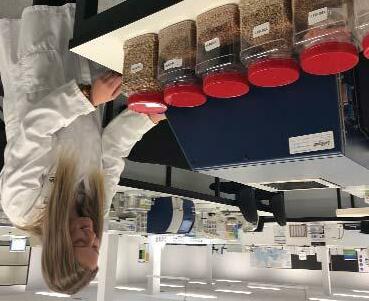
• Grower Workshop - Selling Grain using GTA Contracts
• In-House/customised training
GTA Training & Development delivered the Advisory and Compliance workshop in July 2021. The topics included a focus on compliance and advisory issues, arbitration outcomes, AFSL issues, Competition Law, insolvency issues during the pandemic, insurance industry issues and foreign currency and hedge correlations. These were delivered by highly respected presenters with specialist expertise in their fields.
With the COVID-19 pandemic training and development courses have successfully moved to on-line “live” workshops. This has been well received by industry and students and allowed easier and time effective access for participants from all regions.
GTA has developed training and assessment programs to assist its members and industry participants in upskilling their staff and meeting the needs of the Australian Grain Industry Code of Practice. The Code Assessment Program is an on-line training tool comprising assessment modules in specific grain value chain pathways. The Code Assessment Program can be accessed through the GTA Website.
All GTA Training and Development programs are available to all interested parties as well as GTA members.
The GTA Training & Development Program ensures that trade facilitation processes are well understood at all links in the grain value chain.
GTA Trainers have specialist expertise in the content of each course.
• Advancing independent, fact-based dialogue and advocacy for members and industry stakeholders.
• Improved market access outcomes for its members and the grain industry encompassing new access opportunities, improved access arrangements and maintaining existing market access.
• Effective cooperation and coordination between and among government and industry is critical to achieve, maintaining, and improving market access.
Management of trade and market access issues is critical to doing export trade business. The impact of non-management include:
1.Higher operational and commercial risk for exporters
2.Risk of trade ban or trade restriction
3.Increased costs (compliance, administration, production)
4.Loss of important markets and potential for lower prices to growers and higher prices for consumers.
Given these impacts on members, GTA has continued to focus significant activity in the area of trade and market access. GTA acknowledges the work of other parties in relation to trade and market access and works closely with GGL, GIMAF, Grains Australia, AEGIC and other stakeholders.
GTA works proactively with industry stakeholders and the Australian Government to counter the growth of non-tariff measures (NTMs) by supporting international standards that are based
on sound science. Both industry and governments must work together to build and strengthen science-based trade.
GTA's trade and market access strategy is built around four pillars:
1.Policy - getting the policy settings right
2.Advocacy - in domestic and global forums
3.Support - technical and operational support
4.Communication - creating a collaborative and shared commitment to TMA activities
Complex international markets require an ongoing effort to maintain existing market access, and where possible, secure improved market access and the global rules of trade.
Through its broad membership base of commercial companies and its experience GTA is able to assist with a “frontline perspective” and provide input and information to Government in developing policies and global advocacy programs.
GTA provides leadership to its Members and industry and works to maximise the position of the Australian grain industry in relation to TMA activities and optimise outcomes for industry
• Ensuring policy settings are supportive of grain industry trade
Advocacy
• Proactively promoting the grain industry's priorities and positions in domestic and global forums
Support
• Providing technical and operational support to the industry to address trade issues as they arise and assist to implement appropriate policies to maintain and enhance future trade
• Identify and communicate industry's position
• Advise Government on the impact of trade barriers
• Monitor, articulate and address technical trade barriers
• Engage with and influence trade negotiations, regional initiatives, and other market access initiatives
• Communicate the value of grain trade and the importance of market access
• Build relationships with Government, cross sector representatives and global grain partners
• Provide informed analysis and support to Government and other initiatives
Communication
• Ensuring industry has transparent and open mechanisms for providing input into and receiving feedback on TMA priorities
• Creating a collaborative and shared commitment to TMA activities
• Foster strong engagement with Government and industry in Australia and globally
Barley 20% Wheat 17.1% Sorghum 14.3% Canola 12.4% All cereals 12.4%
Oats 8.6% Chickpeas 3.8% Lupin 2.8% Lentil 1.9% Field pea 1.9%
Fava bean 1.9% Durum 1.0% Cottonseed 1.0% Corn 1.0%
A - Sanitary and Phytosanitary (SPS)
B - Technical Barriers to Trade (TBT)
E - Licensing, Quotas, Prohibitions and Quantity Controls
F - Price Control Measures including additional taxes and charges
G - Finance Measures
M - Government Procurement Restriction Measures
These institutions include:
• WTO
GTA actively builds international linkages to promote the value of the industry and ensure input into global decision-making bodies whose frameworks and decisions can have far-reaching implications for the grain industry.
GTA has proactively initiated and facilitated roundtable industry/Government discussions in Indonesia, China, Thailand, and Vietnam as part of the Australian Grains Industry Conference (AGIC) Asia program and lead global private sector engagement in the APEC NTM Project, led by DAFF.
GTA is a long standing and active member of the International Grain Trade Coalition (IGTC). The overarching objective of the IGTC is to achieve a market and regulatory environment supportive of trade that avoids disruptions in the international trade of grain, oilseeds, pulses and derived products. Through IGTC, Australian industry increases its advocacy to multiple international institutions, bringing Australian issues to the global stage.
• Codex Alimentarius Commission
• International Plant Protection Convention (IPPC)
• World Bank
• Food and Agriculture Organisation - FAO
• International Grain Council (IGC)
• APEC
IGTC has a global reputation of helping develop global grain trade solutions from its member driven consensus approach including:
1.Encouraging forward-looking policies in FTAs to minimise non-tariff measures: -Science based regulatory systems
-Acknowledge “zero” risk does not exist -Commercially acceptable solutions -Risk mitigation methods
2.Developing international initiatives: -Standardisation and adoption of internationally recognised standard methodologies and testing -Promotion of low-level presence policies -Mutual recognition of risk assessments
GTA has been active on TMA issues across a number of key areas as identified below.
Elimination of tariffs An ongoing priority addressed through WTO activities and Articles and Free Trade Agreements.
• GTA has engagement with WTO processes through Direct dialogue with DFAT and participation in DFAT & IGTC activities
• Input into policy in partnership with other industry stakeholders.
• GTA convened and led the industry working group (IWG) addressing China's investigation in relation to Anti-Dumping (AD) and counter veiling duties (CVD) on Australian barley exports. The IWG continues to worked closely with DFAT & DAFF with the issue now formally being progressed through the WTO.
MRLs are an increasing risk in the market. Aligning MRL levels in key markets is a major focus. The NWPGP is the lead agency domestically on all chemical issues and GTA works with IGTC on these issues globally.
• Areas of focus for GTA & industry are advocacy for a scientific base for forming MRLs, harmonisation/synchronisation of MRLs, adoption of IGTC policy principles on MRLs where appropriate, and harmonization with Codex standard.
• GTA works in partnership with NWPGP (funded by Grains Australia) and provides administrative and conference management activities.
• GTA actively engages with DAFF National Residue Survey (NRS) and made various submissions to APVMA
• GTA and NWPGP made submissions to the Australian Chemical Veterinary Review
FTAs (tariffs & technical barriers)
Free Trade Agreements are an opportunity to promote elimination of tariffs/quotas and adoption of disciplines relating to non-tariff measures.
• GTA led the industry response to Government on the implementation of TRQ process for IA-CEPA feed grain market access.
• Provided input to several FTA's including UK, India, RCEP ,EU and IA-CEPA
• Review and updating of disciplines in relation to MRLs, standards and testing and innovation.
Plant protection (sanitary & phytosanitary) i.e. SPS measures around concerns such as plant diseases, weed seeds and pests are a high priority issue for the grain industry. GTA works with GIMAF/Grains Australia Limited and DAFF to address these issues as they arise. GTA also works with DAFF on regional and bilateral initiatives to create an improved operating environment.
GTA works actively with IGTC to advocate at a global level for efficient trade frameworks.
• Areas of focus for industry are:
-Increased transparency and harmonisation through recognition of sampling and testing methods/ Equivalence of systems and processes / Common language & terminology
-Testing/sampling methods based on recognised science
-Recognise 'free from' or risk-based systems approach to certain pests or diseases of quarantine concern
-Adoption of international best regulatory and technical practices (eg CODEX)
-Use of risk and science-based assessments
• GTA works with the Government through regional initiatives including the APEC Grain Trade Facilitation Forum where GTA lead the private sector engagement and prepared a study on the impact of NTMs on the wheat value chain study,
• GTA continues to develop and strengthen relationships with like-minded international trade associations in importing and exporting countries.
• GTA is an active long-standing member of IGTC, serving on its Management Council and as Secretary on the Executive Committee.
Harmonised international methodology
Standards and testing methodologies can cause market access issues where these are not harmonised or consistent
• Promoting Australia's food safety and quality assurance processes with international customers, including AGIC Asia and AGIC Asia Stakeholder Roundtable seminars.
• Ongoing facilitation of the Australian Grain Industry Code of Practice.
• GTA works with the Government, through regional initiatives such as APEC and IGTC to address lack of harmonisation in relation to regulatory approaches, frameworks, and regulations (e.g. inconsistent terminology, product testing, and product labelling, inconsistent or no MRLs, inconsistent sampling and testing procedures) and promote a principle and systembased approach to improve alignment and harmonisation.
• GTA led the private sector engagement for the APEC Grain Trade Facilitation Forum
Biotech & new innovation regulations
Regulation of biotech products or new plant breeding innovations should be based in science and not restrict market access. Zero tolerance policies and asynchronous authorisations are increasing compliance risk and costs
• Maintain the Market Choice Framework for GM Crops and implementation of related policies and response plans.
• Key priorities are synchronous approval of biotech traits, joint recognition of risk assessments for new technologies and harmonised regulatory approaches to new innovations including low level presence policies
• GTA works on these issues through IGTC. Current activities are largely focused around the Cartagena Biosafety Protocol, LLP policy and plant breeding innovation including information sharing with the seed/technology sector.
Sustainability Lack of alignment of environment, social and agriculture goals in ways of demonstrating compliance and associated costs for certification. Sustainability standards imposed by customers can become market access barriers when they are not coordinated or are not informed by industry best practices
• Focus on objective and fact-based dialogue and stakeholder communications
• Published TGD 22 - Sustainability Program Principles and Guidelines
• Promote awareness of Food Safety and reliability of the grain value chain through NWPGP, AGIC Conferences, Delegation presentations and the Code of Practice
• Engaged with International Seeds Federation, through IGTC and with Australian Seed Federation on information sharing of traits in innovative plant technology.
• GTA made a submission to the Tasmanian on its proposed regulations impacting Plant Breeding innovation
• GTA has developed a consultative model to look at market access impacts and information sharing for the Australian industry arising from innovative breeding technologies.
Key issues are: -a lack of transparency around conditions and criteria of import permits -different documentation needed across regions/ markets -inconsistent certification requirements -differences in definitions, methodologies and recognition of certifying bodies -adoption of consumer driven regulations that are not based on science.
Capacity Building Provide leadership and capability development to mitigate risk and improve quality assurance processes in the supply chain. Developing solutions to many NTMs will require capacity building with trade partners to promote international best practice
• E-documentation a key focus for clearer visibility of quality assurance processes through the supply chain. Adoption of digital processes (e.g. ePhyto) will assist to streamline processes and improve data validation
• GTA worked with the Government, through regional initiatives such as APEC, ASEAN and with IGTC on these issues.
• Maintain grain industry NTM and Market Access Database

Grain Industry NTM database to capture and raise awareness of the impact of these issues on industry.
• Food security presentation to International Grains Conference.
• Submissions to Export Legislation consultations
The National Working Party on Grain Protection (NWPGP) is the industry body responsible for providing management and leadership to industry in the areas of grain storage, chemical use, market requirements and chemical regulations. This activity relates to stored grain protection as well as chemical use in-crop and all areas of the supply chain as it relates to market access.
A range of activities occurred during the year both in preparation for the conferences and to assist industry's market access efforts. These included:
• A continued review of changes in chemical regulations and maximum residue limits (MRLs) in domestic and export markets. Markets continually review their MRLs, often decreasing them at relatively short notice. Where those changes were considered as having a potentially significant negative trade impact, liaison occurred with industry on the potential impacts. Discussion then occurred with the Australian Government to discuss solutions to reverse any potential negative outcomes.
Quality Assurance and Market Access Ensure the quality assurance processes and outcomes in the Australian grain supply chain are efficient cost effective and meet Government regulatory requirements to maintain market access for Australian grain.
• Work with the Government to identify international best practice, develop capacity building activities, consultation with stakeholders, and alignment with international and trading partner regulation.
• GTA has led several industry working groups including: -Preparation of Food Grade Shipping Container standard -Development of Grain Sampling Methodology and Procedural guidelines (TGD No 21)
-Export Permit Process (RFP) Review
-Mobile Bulk Loading Guidelines
-Ship Inspection using video capture -Development of Grain Storage Asset and Management Standards

• Ongoing facilitation of the Australian Grain Industry Code of Practice

• Active member of Grain and Plant Products Export Industry Consultative Committee (GPPEICC). This is DAFF's principal consultation forum with grain industry stakeholders on export inspection and certification, export market access and other relevant issues.
• GTA is an active member of the GPPEICC and several subcommittees including Strategy, Finance, Sampling, Request for Permit and Mobile Bulk Loading.
• Major issues addressed by the GPPEICC:
-Development of revised fees and charges for the grain export program
-Revision of inspection and documentation IT systems to facilitate exports
-Ongoing review of Request for Permit processes, including revision of the standards for inspection of empty containers -Authorised Officer (AO) training and interaction with DAFF and industry
-Review of Export Legislation to make sure legislation is practical and contemporary
-Ongoing assistance with the introduction of global ePhytos
-Review of existing sampling processes and development of guidelines outlining the desired process for obtaining representative samples of export cargoes
The Chair of NWPGP is funded by Grains Australia Limited. GTA acts as the secretariat for the NWPGP and continued to undertake this role during 2021/22, supporting the Chair and the activities of the Strategic Working Group and NWPGP Working Groups.
The Australian Grain Storage and Protection Conference is the annual conference for NWPGP. GTA convenes and administers this event. The 2021 conference was deferred from the 2019/20 year (June 2021) and was held virtually in August 2021. The 2021/22 event was held as a combined virtual and in-person event in June 2022. The events successfully provided participants with the latest research and developments in the area of pre- and post-harvest storage and hygiene, chemical usage, international and domestic market requirements and regulations. They also outlined industry's success in meeting market access requirements for chemical residue limits over the preceding year and discussed new and ongoing activities to improve that performance over the next period.
• Major impacts on market access for Australian grain in relation to changing market MRLs, and the progress of developing and implementing solutions, were s captured in the Non-Tariff Measures database as a central reference source.
• The previous year had highlighted the need for all sectors of the supply chain to fully recognise and understand the impacts of chemical use on the trade of grain domestically and internationally. To assist that task, significant advocacy occurred with chemical registrants and those responsible for providing advice to chemical users, being re-sellers, growers and grower advisors, who work closely with users of those chemicals.
• Further advocacy occurred to other relevant sectors of the supply chain via presentations at a number of industry conferences and meetings. Further detailed market, chemical and commodity MRL and chemical regulatory information was also provided to individual industry stakeholders and groups upon request.
• As a consequence of the desire for visibility of information, the NWPGP webpages were updated on the GTA website (www.graintrade.org.au/nwpgp) with links created to a range of material including communication and research extension developed and supported by various industry organisations.
• A revised Australian Grains Industry Post Harvest Chemical Usage Recommendations and Outturn Tolerances document detailing changes to MRLs by commodity and market for chemicals permitted for use post-harvest was published.
• As required, input occurred into various Australian chemical reviews including: -The DAFF review of the agvet chemicals regulatory system in Australia; -Development of the Australian position on topics to be discussed at the Codex Committee on Pesticide Residues meeting that was deferred from 2020 to July 2021; and -Various Australian Pesticides and Veterinary Medicines Authority (APVMA) Trade Advice Notices for impacts on marketing Australian grain.
AGIC is an opportunity for continuity of engagement with Australian grain customers and the important messages of value in Australian grain from quality, reliability and safety










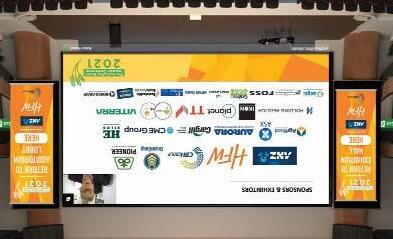
The Australian Grains Industry Conference (AGIC) is a key activity for GTA each year. The annual program includes conferences targeted at both domestic and international audiences. AGIC receives strong support from sponsors and delegates from across the grain value chain and related service industries.
The 2021 Australian Grains Industry Conference (AGIC) was successfully held in September 2021 on a special interactive virtual conference platform, as the COVID-19 pandemic continued to restrict travel and in-person events. The feedback showed AGIC continued to provide a strong technical program and industry connectivity for sponsors and delegates over a special two-day virtual event, with over 330 delegates from more than 200 organisations representing 8 countries participating.
The 2021 Conference program was centred around the themes of "Resilience and Re-invention” which reflected the industry moving out of severe drought and confronting the COVID-19 pandemic. The program was exceptionally strong program with over 35 presenters featuring, an Opening Keynote address by the Hon Dan Tehan MP, Minister for Trade and welcome from David Littleproud MPMinister for Agriculture. Featured sessions included expert panels discussing “Global Driver & Aussie Impacts” and “Revitalising and Modernising the Supply Chain”. A highlight of the program was a panel comprising leading female executives discussing “Embracing diversity in the grains industry”. Also featured was a high-level and popular “CEOs in Conversation” session involving leading journalist Ellen Fanning in conversation with Robert Spurway - CEO, GrainCorp and Rob Rogers - CEO, Allied Pinnicle. Former Australian Foreign Minister, Professor the Hon Bob Carr gave a fascinating interview looking at the relationships between diplomacy, politics and trade.
A strong list of international and local speakers included sessions on global markets, competition in the agricultural sector, generational leaders, consumer trends and sustainability.
AGIC remains the key Australian grain industry event of the year providing experts discussing topical business and industry issues and importantly opportunities for networking across industry.
ACIC Asia 2022 was held virtually in March 2021 featuring a special opening keynote address from Australia's Minister for Trade the Hon Dan Tehan. Support for the virtual format was exceptionally strong with over 650 delegates from 25 countries participating in a broad technical program looking at global market conditions, Australian supply and demand, emerging consumptive trends, and extracting value from Australian grain in poultry and pig feed rations.
AGIC Asia events continue to grow and be well attended by both flour and feed millers with the virtual platform offering a broader reach to communicate the quality assurance and benefits of Australian grain, across the Asian region and globally.
GTA is committed to a the AGIC conferences, in either in-person and/or virtual formats to ensure industry issues of importance can be raised in open forums together with industry networking and connectivity opportunities. Importantly AGIC is an opportunity for continuity of engagement with Australian grain customers and the important messages of value in Australian grain from quality, reliability and safety.
AGIC is co-hosted by Grain Trade Australia, Australian Oilseeds Federation, and Pulse Australia. GTA is the AGIC Conference Organiser.
1.Adequate cash reserves will be maintained to conduct the operation of the business and complete the objectives detailed in this and subsequent Strategic Directions. GTA will maintain cash reserves equivalent to 75% of the budgeted expenses in any one year.
2.Membership fees will fund “trade facilitation” products and services, i.e. the GTA management team, Sector Councils and Technical Committees; and
3.All industry support products will be offered to members at a fee that will encourage participation but also reflects a reasonable return on funds invested by the broader membership.
The company has generated a surplus of $124,861, as compared to a surplus of $ 245,747 in the previous year. Net equity at 30/6/22 is $1,643,579.
As a not for profit organisation, GTA cannot distribute profits or build excessive cash reserves.
The following factors contributed the financial accounts:
• Higher production levels and consequently stronger supply chain throughput have generated buoyant industry conditions in 2021/22, however membership revenues (which were based on FY 2020/21) were still impacted by dry seasonal conditions in that earlier period.
• Training and Development margin was stronger due to higher participant volumes (likely in response to better seasonal/industry conditions and COVID-19 related issues) meaning most programs were delivered on-line, which has been favourable for delivery efficiencies.
• Lower staff and Director travel and accommodation in the last quarter due to COVID-19
The following information was extracted from the financial statements of Grain Trade Australia Ltd for the year ended 30 June 2022 and is included for information purposes only.
A complete set of financial statements and independent Audit Report issued by LBW & Partners, Chartered Accountants, can be accessed on the Grain Trade Australia website.

For the year ended 30 June 2022
2021
REVENUE 1,982,385 1,733,604
Interest revenue calculated using the effective interest method 517 2,206
Direct expenses (361,579) (619,737)
Employee benefits expense (713,550) (684,663)
Depreciation and amortisation expense (74,952) (77,902) Rental and lease costs
Consultancy and legal expenses (177,625) (42,233)
Travel and accommodation (110,268) (36,647)
Special projects (240,000) (226,165)
Other expenses (172,722) (154,320)
Finance costs (7,345) (10,313)
Total expenses (1,858,041) (1,490,063)
SURPLUS/(DEFICIT) BEFORE INCOME TAX EXPENSE 124,861 245,747
Income tax expense -
SURPLUS AFTER INCOME TAX EXPENSE FOR THE YEAR124,861 245,747
Retained earnings at the beginning of the financial year 1,518,718 1,272,971
RETAINED EARLINGS AT THE END OF THE FINANCIAL YEAR1,643,579 1,518,718
As at 30 June 2022
2022 2021 $ $
Grain Trade Australia Ltd
For the year ended 30 June 2022
2020Retained earnings Total equity $ $
Balance at 1 July 20201,272,9711,272,971
Cash and cash equivalents 1,137,708 518,905
Trade and other receivables 341,334 323,921
Contract assets 37,008 96,014
financial assets 1,329,800 1,329,800
Prepayments 64,832 123,664
current assets 2,910,682 2,392,304
Right-of-use assets 156,151 240,032
Total non-current assets 156,151 240,032
2,632,336
Deficit after income tax expense for the year 245,747 245,747 Other comprehensive income for the year, net of tax - -
Total comprehensive income for the year 245,747 245,747
Balance at 30 June 2021 1,518,718 1,518,718
2021Retained earnings Total equity $ $
Balance at 1 July 2021 1,518,718 1,518,718
Surplus after income tax expense for the year 124,861 124,861 Other comprehensive income for the year, net of tax - -
Total comprehensive income for the year 124,861124,861
Balance at 30 June 2022 1,643,5791,643,579
Trade and other
Lease
215,657 136,171
887,465 599,325
80,918 77,652
120,748 103,136
Grain Trade Australia Ltd
For the year ended 30 June 2022 2022 2021 $ $
Cash flows from operating activities
Receipts from customers (inclusive of GST) 2,484,546 1,851,759
Payments to suppliers and employees (inclusive of GST) (1,784,015) (1,637,457)
Interest received 517 2,206
94,992
23,474
Government COVID-19 related benefits received - 90,500 Interest on leases (7,345) (10,189)
Net cash from operating activities 693,703 296,819
Investment in term deposits - (700,000)
Net cash used in investing activities - (700,000)
Cash flows from financing activities
Repayment of lease liabilities (74,900) (69,157)
Net cash used in financing activities (74,900) (69,157)
Net increase/(decrease) in cash and cash equivalents 618,803 (472,338)
Cash and cash equivalents at the beginning of the financial year 518,905 991,243
Cash and cash equivalents at the end of the financial year 1,137,708 518,905
Level A1
(over 7 Million Tonnes)
CBH Grain P/L Viterra Australia P/L
Level A2 (5–7 Million Tonnes)
GrainCorp Operations Ltd
Level A3 (3–5 Million Tonnes)
Cargill Australia Limited
Level A4 (1.5–3 Million Tonnes)
ADM Trading Australia P/L
Level B1 (1.0–1.5 Million Tonnes)
Emerald Grain P/L Manildra Group
Level B2 (500,000–1 Million Tonnes)
Arrow Commodities P/L
Australian Grain Export P/L
Bunge Agribusiness Australia P/L
CHS Broadbent P/L
Centre State Exports P/L
Cofco International
George Weston Foods Limited
Inghams Enterprises P/L Ridley Agriproducts P/L
Riordan Grain Services Riverina (Australia) P/L
Level B3 (250,000–500,000 Tonnes)
Allied Pinnacle P/L
Brahman Commodities P/L
Louis Dreyfus Company Australia P/L
Quadra Commodities P/L
Robinson Grain Trading Co P/L
WIlmar Trading (Australia) P/L
Level C1
(over 10 employees, under 250,000 Tonnes)
Adams Australia P/L
Agriex Australia P/L
Agrisk Management P/L
AGT Foods Australia
Associated Grain t/a Agrocorp Processing Australia
Auscott Ltd
Australian Fresh Milk Holdings (AFMH)
BFB P/L
Blairs Produce Company
Boolah Farms P/L
Castlegate James Australasia P/L
Coprice
Darwalla Milling Co P/L
Deacon Seeds Company
Deckert Group P/L
Esperance Quality Grains
Five Star Stock Feeds
Fletcher International Exports P/L Hanlon Enterprises Grain
Independent Grain Handlers
Irwin Stockfeeds
Itochu Australia Ltd
Inari Australia P/L
J K International P/L
Rex James Stockfeed P/L
Jerilderie Grain Storage & Handling
K M & W M Kelly & Sons
Laucke Flour Mills P/L Lawson Grains P/L
LDC Enterprises Australia P/L LINX Cargo Care
LPC Trading P/L
Malteurop Australia P/L MC Croker P/L
MSM Milling Pty Ltd
Namoi Cotton Ltd
Newcastle Agri Terminal P/L
Premium Grain Handlers P/L
Quattro Ports
Reid Stockfeeds P/L
Five Star Stock Feeds
Rivalea (Australia) Pty Ltd - Animal Nutrition
SunPork Farms Feed Mills
ThriveAgri TSS Grain (Tasmanian Stockfeed Services)
Unigrain P/L
Viridis Ag W B Hunter P/L Wilken Grain Woods Grain P/L
XLD Commodities
Yenda Prods Grain P/L
Level C2 (under 10 employees, under 250,000 Tonnes)
A T Waterfield & Son P/L
A W Vater and Co
Advantage Grain P/L
Access Grain P/L
Agmark Commodities
Agracom P/L
Agri Om Australia P/L
Agri-Oz Exports P/L
Agromin Australia P/L
Australian - Asian Agricultural Exports P/L
Australian Choice Exports P/L
Australian Grain Storage
Australian Growers Direct P/L
Australian Mungbean Company P/L Baker Grain
Boort Grain Co-Operative Broun and Co Grain P/L C & S Trading P/L
C K Tremlett P/L Carpendale Agri P/L
Carson Stockfeeds P/L Chester Commodities P/L CL Commodities P/L
Coorow Seeds
Cory Johnston (Aust) P/L
Craig Tyack Grain Trading Demeter Cormack P/L
Defiance Maize Products P/L Direct Grain P/L Direct Commodities P/L East Coast Stockfeed P/L Ellerslie Free Range Farms P/L
ETG Commodities P/L
ETG Processing P/L t/a Wimpak Export Trading Group Australia P/L Fanmac Logisitics P/L Feed Central P/L Findlays Barellan Grenfell Commodities P/L GO Resources P/L Gold Star International P/L Grain Link (NSW) P/L Grain Link WA P/L Grainforce P/L GrainTrend P/L GV Grain & Fodder
Hartree Partners (Australia) P/L Harwood Grains P/L J W Koek & Company
KB Agri Services P/L Kangaroo Island Pure Grain P/L Kennett Rural Services P/L Lachlan Commodities P/L Lake Grain P/L Lane Grain P/L Laragon Almond Processors P/L Lemarc Agromond P/L Mandala Trading P/L Marina Commodities
McKenzie Ag Services McNaughts Grains & Fertilizer P/L Matthews Transport and Grain Traders
Max Grains P/L Melaluka Trading P/L Mellco P/L
Moulamein Grain Co-Operative Ltd Nandaly Grain Co-Operative Ltd Network Grains P/L
Origin Grain P/L
Pacific Global Sprouts P/L
Parkinson Bros
PB Seeds P/L
Pearson's Grain P/L
Peters Commodities P/L Pinnacle Grains P/L Plum Grove P/L
Preston Grain
Pure Foods Eggs P/L
Quirindi Grain & Produce RP Grain P/L
Ruddenklau Grain P/L
Rural Logic (Aust) P/L
Shannon Bros Bulk Storage P/L
Silo Bag Grain (NSW QLD) P/L Societa Cofica P/L
Southern Cross Agricultural Exports P/L
Spagricon Australia P/L
Standard Commodities Australia P/L
Sudima Australia P/L
Surat Bulk Grains
Southern Grain P/L
Southern Grain Storage P/L Swiss Singapore (Australia) P/L Tamma Grains Australia P/L
TRC International P/L Ulusoy Asia Pacific
Universal Commodity Management Ward McKenzie P/L
Watson's Bulk Logistics WHG Oceania P/L WW Agri P/L
ZTC Australia
Crawfords Freightlines P/L
Gehrke Grains and Transport P/L
Hamilton Contracting (NSW) P/L
Horne Ag Logistics P/L
Pacific National (NSW) P/L
SEAWAY Intermodal P/L
Medium
Fox Commodites P/L
Grain Brokers Australia
Horizon Grain Brokers P/L iGrain.com.au P/L
McDonald Pelz Australia
Perkins Commodity Brokers
PURE Grain
Quest Commodities P/L Rain Argibusiness StoneX Financial P/L Teague Australia P/L
A C Grain
Allied Grain P/L
Cogeser (Australia) P/L Farm Tender Lotema P/L
Mallon Commodity Brokering
Wimmera Mallee Grain Services
Woodside Commodities P/L
Large
ASX Limited Australia And New Zealand Banking Group
Australian Grain Technologies P/L
Barrett Burston Malting Co P/L
Commonwealth Bank of Australia National Australia Bank Ltd Medium AgriDigital
Agrifood Technology P/L Amspec Australia P/L Australian Superintendence Company
Commodity Inspection Services (Australia) P/L
Foss Pacific P/L Holding Redlich HFW Australia Intertek
Oldendorff Carriers SBA Law
SGS Australia P/L
T-Ports P/L
Qube Logistics (SB) P/L t/a Qube Agri Small
Advance Trading Australasia Ag Scientia P/L
Aperture Ag P/L
Basis Commodities P/L BSM Global P/L
Clear Grain Exchange
CloudBreak Grain Marketing P/L Delta Agribusiness P/L
EP Integrated Commodities P/L Farmanco Marketing P/L
FarMarCo Australia P/L
Finesse Solutions P/L
Flexi Grain Goldstar Commodities Graintec Scientific P/L Grainx
Guud Asset Cerium P/L HarvestCheck P/L
Hay Plains Grain Storage P/L
IKON Commodities P/L Indyn P/L
Lachstock Consulting P/L
Longbridge Commodities P/L MarketAg P/L McMullen Consulting P/L Mercari P/L
Merricks Capital Services P/L Mirfak P/L
National Grower Register P/L
OMIC Australia P/L
Perten Instruments Australia P/L
Planfarm Marketing P/L
Priag Marketing Pty P/L
Primal Foods Group
Profarmer Australia P/L Rise Agribusiness P/L
Pinion Advisory
Saputo Dairy Australia P/L SGA Solutions P/L
TE Storage & Logistics P/L
Ten Tigers
TT Club Mutual Insurance Wattletree Consulting P/L
CIS– Commodity Inspection Services
Australia Export Grain Innovation Centre
Grain Growers Limited
Grain Industry Association of WA Grain Producers Australia Ltd NSW Farmers Association
Grain Industry Association of SA Grain Industry Association of Victoria Grain NSW Inc
Queensland Agricultural Merchants Inc.
Mr Mervyn May
Mr Christopher Kelly
Mr Geoff Honey
Mr Terry Deacon
